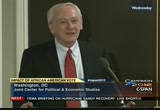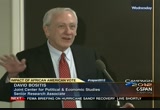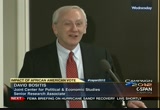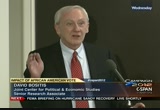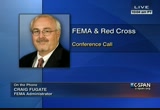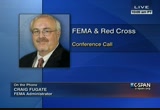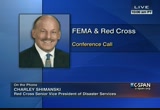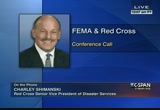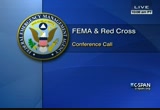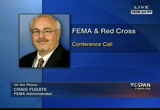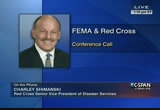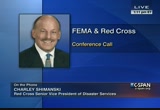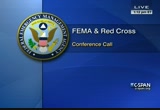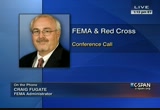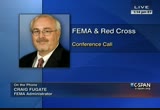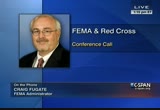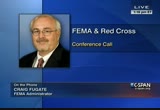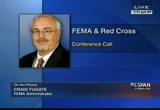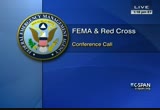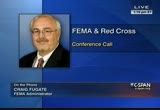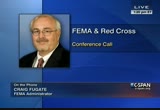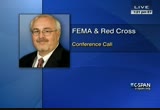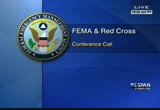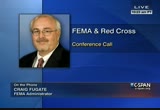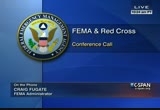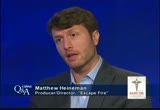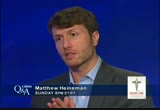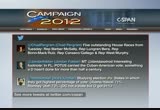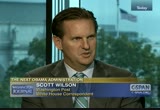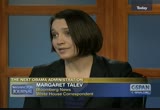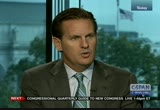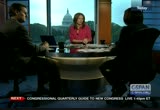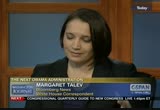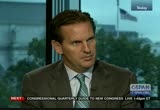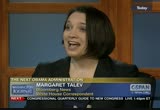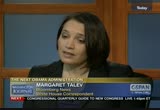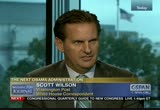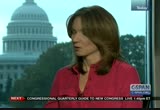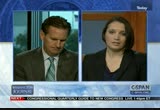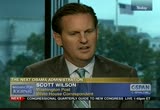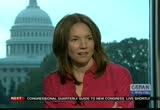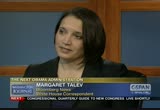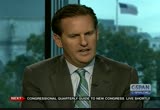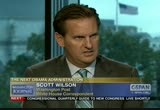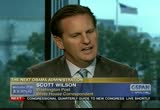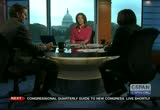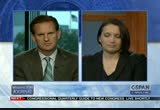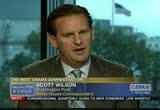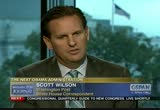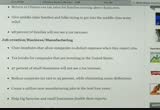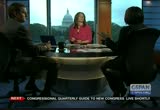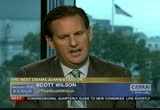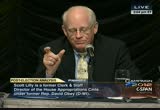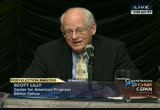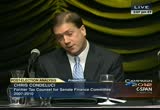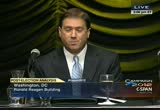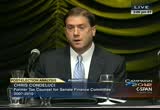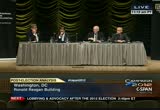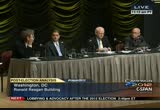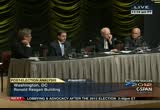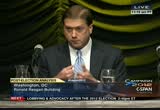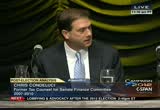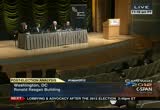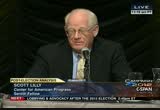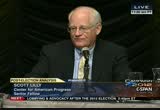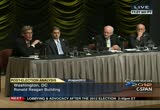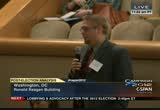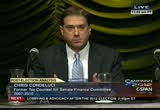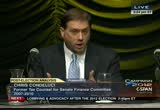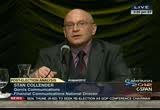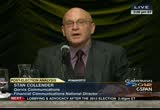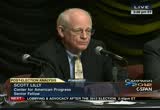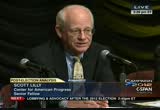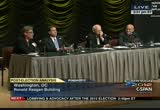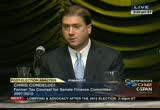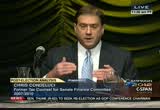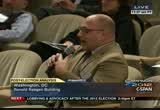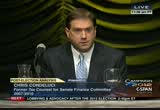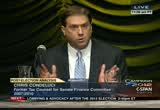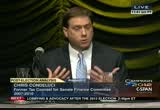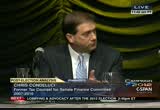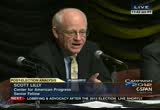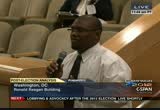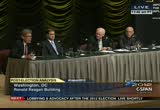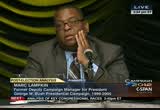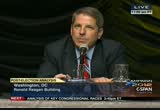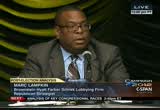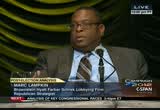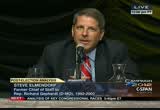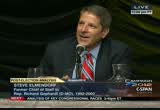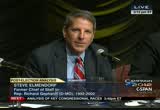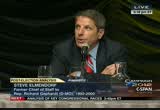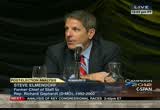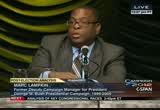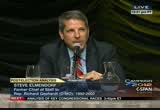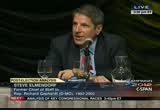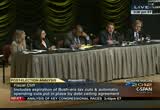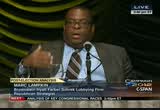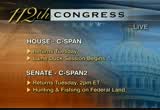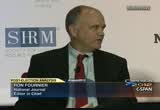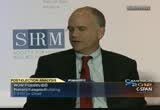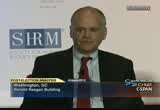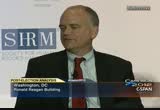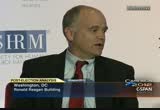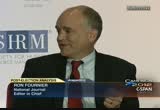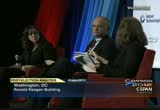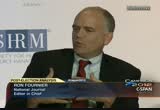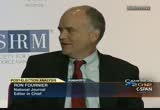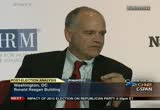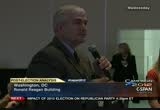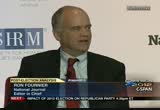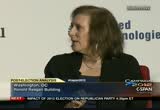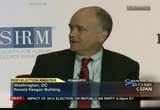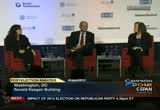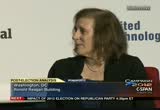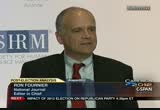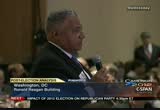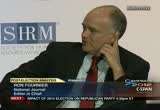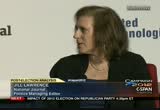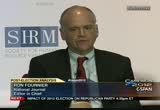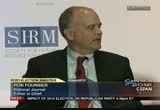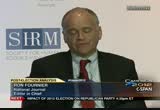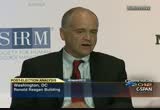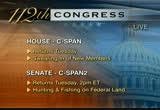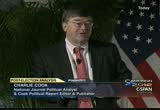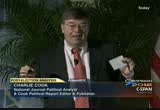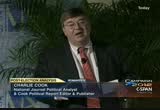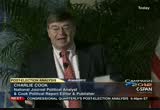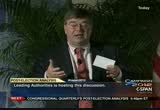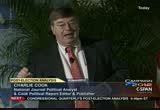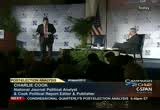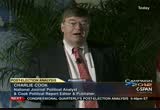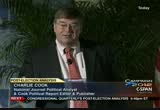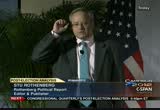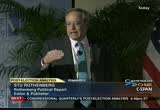tv Public Affairs CSPAN November 8, 2012 1:00pm-5:00pm EST
1:00 pm
who says that barack obama is really a conservative. he says the rebel guns are radical and obama is really a conservative in terms of the things he advocates. i would say there is a conflict that is going to be exacerbated, and there will be a lot of tension between two things. one is the biggest influence of the tea party and their supporters has come from defeating republican incumbents in the republican primaries. for example, this year, richard lugar was defeated by mourdock in indiana. if richard lugar had been read- nominated by the republicans, that race would have totally disappeared. there would be no news stories
1:01 pm
about it, it would have totally disappeared. instead, a person was nominated who was -- who defeated lugar was a key party person who said his idea of compromise was the democrats coming over to his point of view. in missouri, i have to admit clear macaskill is a very clever politician, and she did spend $2 million of her own money to get todd akin the republican nomination. if what used to be called the republican establishment was more on their toes, they would have done a lot more to make sure that akin -- it turns out long after he was nominated, it turns out he had been arrested many times, demonstrating in the
1:02 pm
abortion clinics in the 1980's -- not what you really want in terms of a candidate who was going to have broader appeal. same thing happened in 2010 nevada, when sharron was nominated to vote -- to run against harry reid. harry reid was considered to be road kill. they. and harry reid what. in dollar-denominated that -- in delaware they nominated that wiccan. there are republicans who are looking at their losing power and thinking we have got to do something different.
1:03 pm
but even among those people, there is a fear if they decide to do something different, olympia snowe, who was wildly popular in maine, do you really think if she had been nominated that she would not be elected? there would not be a race. she did not want -- she had had it with trying to adapt to this new reality that involved the tea party people. so the question is, is that, which is going to dominate -- fear or opportunity? >> about 15 minutes or so left in this discussion. you can see this in its entirety at the c-span video library. now the latest on the hurricane seen the hurricane response with craig fugate, and charley and nancy. you can also hear this on c-
1:04 pm
span3. >> update on the response to hurricane sandy. >> afternoon, everybody. i will be brief because i figure you got more questions. some of the highlights from the last couple of days. as of this morning, around 6:00 a.m., and we will have numbers later this afternoon be looked at you, but 317,000 folks have registered in the three states for individual assistance. and a total of -- is three had a 20 million for the three states. the yesterday northeaster had impacts appeared in many cases precautionary measures were taken to shut down operations. there was concern about that, but it was based on the forecast the day before when decisions were made, said those were done
1:05 pm
in coordination with state and local officials. power outages increased slightly. power outages due to the nor'easter did increase the number of customers without power, and as of this morning, about 42,000 people in addition to those who have lost power from sandy are reported out. that number is down from the original impacts of the northeastern, but we continue to cede power restoration. the numbers improved. with the index yesterday, the numbers did the back up. total customers across several states now is about 700,000. numbers are being reported in a couple of states that had not been in previous totals. massachusetts and rhode island were added into these totals as well as we continue to attract connecticut, new jersey, new york, and west virginia from the original impact of sand. with that, i will turn it over to charlie.
1:06 pm
>> thanks. good afternoon, ladies and gentlemen. good morning, and the west coast weather conditions improve, the american red cross is expanding our large scale operations to committed to provide shelter and hot meals and supplies. our extensive feeding operations are operational. i should mention as we learn about specific neighborhoods in need, we are immediately moving to mobilize with people, food, water, relief supplies, and comfort. where working with the meals on wheels association of america and feeding america on delivery for those that may be homebound, delivery of either hot meals or multi-day disaster meal kits. volunteers are resuming their distribution activities into the
1:07 pm
communities, and before this storm, in advance we ended out tens of thousands of ready-to- eat meals and cold-weather items for folks to be prepared for the store. in terms of the full hurricane sandy response, we have mobilized the entire emirate full resources of the red cross across the country to make sure we're getting help to people impacted. 200 feeding vehicles from the red cross have been mobilized to the east coast. more than 5700 workers from all 50 states and three u.s. territories are on the ground. 90% of those are volunteers. last night about 7600 people stayed in more than 110 shelters. to date, we have served more than 3.3 million meals. in fact, provided more than 29,000 health services and mental health, emotional support, and handed out 125,000 relief items.
1:08 pm
we are mobilizing a large relief effort this weekend, providing comfort kits and other import materials to those who will need them in the coming days. you have a lot of questions, so that i will turn it back over to it had 34 questions. thank you. >> thank you. we will be taking questions from reporters. i ask that you ask one question so we can get to as many as possible today. with that, operator, can we have our first question please? >> if you want to ask a and pleas deess * 1 yearning. one moment. -- and please state your name. what mom. the first question comes from jeffs. >> want to ask about temporary housing. i know out on staten island today have no hotels or motels. where are you putting those
1:09 pm
people? are they going to another state or other boroghs in new york? >> are going to places where they can stay. some people have selected options based upon where there is open hotels, and some people are staying as far away as albany. our goal is to get people back in their communities. that is why we're working with the state of housing solutions, including something that i .alked about this canno we're moving manufactured housing to the area. we do not have specific locations yet. we are looking at all options that we can use to house people. again, where we have hotel
1:10 pm
space, and we can get apartments or other things we can police, we're doing that, but in more suburban areas we're looking at what else may be possible to keep people in those communities. >> next question. >> hi, as is for mr. shimanski. despite all the things the red cross has been doing, we still keep hearing complaints that the red cross is not here, it is not there. still complaints from the far rockaways from staten island beach. i just wonder if how you interpret this, and if you feel that the red cross was adequately prepared for this storm, and maybe you are stretched too thin to provide what people expect. >> thank you for the question. we appreciate all the feedback we're getting from the emergency
1:11 pm
operation centers and others cannot leadership in communities as to the red cross response. we are utilizing that feedback as well as social media and many other sources to help us identify the places where the red cross needs to be. we are mobilizing and moving resources as we can. as you all have noted in your coverage of this story, in many cases there were areas that were out of communication that were inaccessible, sometimes roads were closed, traffic snarls, and such. we have been able to move resources as communities have been identified in need. this is one of the situation that before the storm we had already pre-deployed leadership materials, products, into the key areas, but what i will not do is deployed my people into harm's way. when in the areas such as a
1:12 pm
couple of those mentioned, where there were evacuations books before the storm occurred, we need to wait for an assessment until after the storm had passed determine whether it was a for folks to get back in, and get assessments as to what were the areas of greatest need. we have our entire fleet the point for this storm, and nearly 6000 volunteers, so we feel like we have the resources we need, we have a great partnerships with government, we have feeding operations at not even full capacity in terms of meeting the needs, so i feel like we are where we need to be and we appreciate the feedback. when we hear about a community that needs to be addressed, we addressed it right away. >> that. next question, please. >> i was informed parties to please ask one question at the time. that is one question. the next one -- line is open.
1:13 pm
>> on this question is for craig regarding fema. we have been hearing of people who have been tonight feed at 8 on the ground that their house is livable, that the fact that the ground floor was flooded. who is and who is not eligible for aid? is there a limit on it? what is the factor of deciding who gets a then who does not? >> based on several factors, one of which is the focus on housing assistance. rental assistance, temporary short-term assistance. if they are living in their past, when it's happening until we can get out there with inspectors to look at happened -- at damage, the, this is reimbursing them for their losses. if you cannot stay in your home and you have that situation, write the story but give the context of our people can rent reach out to them. the hierarchy of assistance is
1:14 pm
in the assistance is based upon uninsured losses, so if you have insurance, you may not get assistance, and in some cases, until your insurance settles, you may not know if there is eligibility. the second with the sba disaster loans, and this is a common challenge for us. people, because of their income levels, who could afford a loan, will get a loan package from sba, will take that loan package, decide they do not want to apply for loans, and they did not understand if it is not evident because of their income that that will not work for them, they actually have to apply to sba to determine their not qualified for that loan. but also open up the possibility for fema grants. the grants are very limited. again, matching out the entire grant program is about $31,000. housing assistance and rental assistance is not capped at
1:15 pm
that. if there are people who are not in their homes, need a place to stay, and you have this cont acts, let us know what is gone there. if there are people who have losses that are not in short, when the inspectors get out there, we will do those claims again. they may get a small business administration disaster application, because we do look at a means test. it is not a dollar figure, but we use it means tests that are standard with the federal government on determining income levels, and if sba can make a loan, can cover your losses, that is the means test. in some cases we know because assistance they are already receiving or because of income levels come that would not occur. and we will provide this grant directing. it is a bit long for this
1:16 pm
question, but you have got to understand it is a hierarchy of needs. losses that are uninsured where an individual who would not otherwise qualify for any small sba disaster loan may get assistance, but the party right now -- the priority is on housing assistance, and a secondary its losses trick if they can stay in their homes, that may be something that either they are going to get a loan package or the inspector still has not been out to see the damages. along with it, but i want to make sure we got that right. >> next question. , mute yourress * 1 phone. our next question comes from alicia called webb. >> can you give it more specifics about manufactured housing, when it is coming in, where, and where it will go? >> it is coming from one of rare staging areas that will the going to act eric, and i do not have pad sites.
1:17 pm
i will give you details on the staging areas. route.y ar ane en we did not have sites where people can move into. that is being worked on simultaneously, but he started moving some of the units in stock that we maintain in our state areas, and we will get out a fact sheet on that today. >> thank you. next question, please this is from jennifer maloney, your - 7. >> i was wondering if you could help us clarify the number of people who are in motels and hotels, how many people have been given housing, rental assistance. >> i can give you the breakdowns on the type of assistance, and i will have our staff give you further breakdowns. what i have are those people that are getting housing assistance, and this is the
1:18 pm
renter's assistance and temporary housing assistance, that we have already approved, is the bulk of that three had a $20 million. it is over $308 million that is going toward that type of assistance. the other things where people have losses that are eligible, which call the other needs assistance, is right now $12.5 million, and there is some additional dollars in each one of those columns. if that did not add up exactly, we will get you the exact details. the bulk of the money is going toward the renter's assistance, we can get you the updated fact sheet on how much of that is in the temporary shelter assistance, which is for people who are in shelters and how much of that is renter's assistance for people who have apartments or places they are renting. >> next question, please. >> your line is opened.
1:19 pm
, yes, can you hear me ok? >> yes, we can. >> this is for craig. could you describe as you shift from the emergency disaster relief to moderate-term assistance, what are you during differently and what have you stopped doing? >> almost all the immediate response efforts were state and local, so some of the things that have ended and are transitioning back are like the federal urban search and rescue teams, since the search and rescue is completed. we're doing work with commodity items. as we start seeing longer term recovery operations, you will hear acronym's out there, the joint field office, and this will be a established location is that right now we are working in the local emergency operation centers and are working to spread out in different places.
1:20 pm
both in new jersey, connecticut, and new york, which will be in the process the next couple of days establishing a more prominent location to bring all the teams together as we start looking at long-term recovery. that is not going to impact the immediate response, but it is the anticipation as we start moving away from mass carriage as over the next days and weeks as areas at power. what have a more permanent worksite to continue the operations. essentially, the only thing on our side that is starting to -- and rescue is completed, if you got battered utility coverage, some of the commodity flow. we're looking at how much stuff we're delivering and how much is being handed out, and based dupont in packs, would that need to continue or will we start decreasing those orders? nothing gets turned up into the have said weams
1:21 pm
are ready for the next step, but we're beginning to look at the longer-term recovery including reimbursement, and as we get assessments and damages, looking at uninsured losses that state and local governments have in terms of local infrastructure. >> next question. your line is open. >> i am following up on a question about the housing assistance. we have the numbers for how much dollars, but i have yet to get a number for the people. and i think that is what the previous question was about. how many people are we talking about that have settled in various housings and what housings are they? >> i do not have that in front of me, but we will get you
1:22 pm
that information. what i got is who is registered and the number of dollars out. we can give you breakdowns on that type of assistance. we may not be able to tell you where everybody is stain, which would actually be one of the things i do not think we have the exact information on. in some cases people get renter's assistance and to not need further assistance. it is the ones that we are doing direct lease-ins at we are getting an idea of those locations. i will get you those breakdowns. i do not have them in front of me. >> next question, please. >> one moment, please. the next question comes from richard. your life is open. >> you tell us how many
1:23 pm
specific temporary housing units you possessed in your inventory, where they are stored right now, and if you are ordering the manufacture of new units. >> we will get you those facts. i know we had several hundred that we were moving, and we were looking at what the potential to install rate would be before we moved additional ones, and then we are looking at still not getting yet what federal demand would be for additional manufactured housing. we will give you what we got, but also understand as the task force is working, and locals get a better idea of that, the numbers may need to be adjusted based on demand. we have started moving those we have in storage, and we have looked at our ability to contract for additional, which will either come from the manufacturing or from existing housing stocks. we now use hud's approved
1:24 pm
housing, so this is the mobile homes, i guess that correct term is manufactured housing that the hud's standards. >> it looks like we have time for two more questions. >> the question comes from terry, and please answer publication. >> if we could focus back on new york, a lot of residents in queens and staten island said a lot of the center set up by fema were closed up last night for the nor'easter, and that still had not been opened. when can these residents expect the centers to be reopened are you there at the center or are these reports we're getting, because we want to make sure we are ground-truthing this. do you have people saying this or are we still getting reports?
1:25 pm
>> reports in the nmedia. >> we will start pulling them and as of this morning they were starting back up if there was not any additional damages or anything that would preclude them from opening. we will run the ground-truth and see what we have. >> last question. >> your line is open. >> most of my question has not been -- has been answered, but i want to get a clarification. the manufactured housing, they are all mobile homes, and they are not katrina houses, or anything like that. in katrina, they work up for most years, i think. how long do you think these
1:26 pm
mobile homes will house and have they been tested for form of a high? >> these are existing structures that people qualify for v.a. and hud loans for. our traditional programs are 18 months. a lot of those are are to be how many homes are going to be repaired, and working closely with high and secretary donna onvan, and they have issued a regulation for what has to be approved by paul. i need to differ back to what the standards are. hud approves standards that are those standards used to approve loans for buying manufactured housing. >> that you so much. this concludes our call for
1:27 pm
1:28 pm
into an innovative program at walter reed, where they ended up using acupuncture, meditation, using other techniques to wean him off of the drugs he was on, and through this program he was able to walk out of walter reed on his own 2 feet. i commend the military for two things, one, for allow us to tell this story, both the good and bad, but for recognizing this problem, by recognizing that there is this problem of overt-medication and they are looking for outside the bloc ideas in to order to fix it. the piece of the film, the metaphor of a step -- of escape fire is the status quo is not working. >> war with a producer war -- more with the producer of "
1:29 pm
escape fire." a live picture from the ronald reagan building in washington, where we will continue our live coverage of a post-election discussion and analysis, "cq" ."oll call live coverage starting at about 1 pop 45 eastern. while we wait, we're keeping an eye on tweeds that reporters are posting about the election.
1:30 pm
again, coverage of the "cq" "roll call" discussion coming up. right now, war on the election and what is next for congress on to de's "washington journal." reporter roundtable with margaret talev from bloomberg news and scott wilson from "the washington post." here is your special coverage from this morning. what is next? what is the first item for the second obama administration? guest: the first question is the so-called fiscal cliff, which no one wants the country
1:31 pm
to go over but no one as a way to fix. the president will spend most of the next year working on that. he will have staff issues to work on with turnover in his cabinet, and the senior levels in the west wing as well. things he will take on first. host: margaret talev, what did you hear from him wednesday about negotiations on the fiscal cliff? reached out to leadership and that he was serious about tackling this. vice president joe biden, in more detail, also said that he are serious about doing this. a big part of this is in terms of perception, is the president reaching out and engage in more than he has in the past, and not just with republicans, but his own party.
1:32 pm
"dial tumble's most in one year after presidential elections." guest: what if he had not reached out, right? part of what is going on in the markets might have to do with concerns about europe, but some of it has to do with divided government, and on the one hand this is not a huge surprise. it is not like a broad expectation was mitt romney was going to run away with the election and everything would change, but until there was no answer wall street was holding its breath and the initial reaction was to say that we are worried about uncertainty between now and the end of the year. host: scott wilson, what do you here in in terms of one of which were you hearing in terms of whether you get -- what are
1:33 pm
you let the bush era tax cuts expire? guest: the president said he is going to let those expire, and part of the discussion in the white house and capitol hill is what is the meaning of his election? what were voters saying? mitch mcconnell said this is not a mandate to continue the excesses' of your first term. john boehner seemed more open to the idea of allowing more revenue, the rate increases on fiscal cliff issue. i think the president, and i know his left wing, is certainly holding him to the pledge on the campaign trail that he will let the proper rate expire at the end of the year and intends to hold his own in arguing for that. host: margaret talev, that brings up the mandate question. does he say what george w. bush said, i have political capital and i intend to spend it? guest: if you have it, use it,
1:34 pm
or what other people say it for you. right now, president obama's game is not to come out of the box, acting takeda, and give republicans -- acting cocky and giving republicans an idea -- a reason to want to stick it to him. he is saying let's get this done. that is what he is serious about, there is no reason to set yourself up as having more leverage than you do. host: margaret talev, and the go to this headline in bloomberg. what does he do on his health care law, if anything? guest: so, it really is a
1:35 pm
little bit of the congress, and this will play out in fiscal cliff and debt reduction negotiations, but a lot of this is in the hands of the states and whether they want to engage on the medicare front and in setting up their own exchanges. this will play out fairly quickly in the coming weeks. the notion of a repeal effort of what mitt romney pledged is gone now. there will be tinkering around the edges and governors making decisions pitted the individual state will have a lot to do with how the state receives it. host: scott wilson, "the washington post," your colleague, "jobs will be the real test for obama." guest: i think that the second to the fiscal cliff.
1:36 pm
if all of the bush era tax cuts expire without any renewal, and all of the sequestration, across-the-board spending cuts take place, some economists estimate two, three, four points off of gdp, plunging the country into another recession. the best job plan for the president is making sure those things do not happen, and then after that we will see what he proposes again, whether it is a mix of tax cuts for small businesses and stimulus, but that is the primary focus. host: what about the immigration reform, margaret talev? when does that come up? guest: in some ways it already has. you saw the latino turnout, 70%, which set up latino activists saying basically to obama that you owe us.
1:37 pm
even states like texas and their future, there is discussion about that, but how have -- how fast will that happen with the fiscal cliff and divisions among the republican base and among the democratic party, moderates against liberals, it is complicated to figure out how big you can go with immigration in a year where the grand bargain will be the biggest thing on the table. host: politically, is that issue now a wedge one? guest: it has always been a wide -- wedge different motivation than they did three days ago, and they will look to who is the head of the republican party, with their platform be? they hear a different calculus to figure out, -- they have a different calculus to figure
1:38 pm
out. the democrats, and president obama, and for the purpose of his legacy, if they don't try to move forward with a real package that has a prospect on immigration reform, if they try to use it as a wedge, they may find themselves with a problem with the latino base. host: this from "the washington post" today. scott wilson. guest: i think it is following what margaret said. the republicans lost latinos by 40 points. they are losing by huge amounts. some people think by 2016 and beyond, texas could come into play as a swing state.
1:39 pm
there is not a huge urgency on the republicans to try to repair that damage. after a republican primary showing mitt romney talking about self-deportation. i think there will be more -- even before tuesday, the white house will most likely find a place to work with republicans on immigration. host: let me go back to jobs from the associated press this morning. i just wanted to add that to the mix, given that jobs could be the second item for president obama. let's go to knoxville, tennessee, a democratic caller. you are on the air.
1:40 pm
caller: if the republicans are serious about compromise, they would take out their grover norquist pledges in front of cameras and tear them in half and say we are not going to put this one man in front of 300 million americans. i was happy to hear harry reid yesterday trot out the filibuster and possibly want to serve that up for thanksgiving. that is my comment. thank you. guest: they are probably not going to take those out and tear them up but you are starting to see john boehner and other republicans try to figure out what language to use to try to indicate they would be willing to negotiate revenue.
1:41 pm
increases in federal revenue as part of a comprehensive package which will be the boundaries of this negotiation, the idea of trimming deductions and loopholes. in the end, more federal revenue means someone is paying more in taxes whether it is a tax increase or deductions they were not getting which amounts to an increase. host: let's go to virginia, a republican caller. caller: i have two comments. the first one regarding the many comments i have been hearing this morning about the mandate. president obama won the election and i congratulate him. we have 57 million people who voted for governor romney.
1:42 pm
we have 57 million people plus voted for some or all of the president's policies. we cannot forget these people because we had 63 million people vote for the president. as a country, we are deeply divided. guest: he is right and i do not think that is lost on the president. this was not a showy, cocky "i won and you guys are going to have to live with that" type of speech. he thanked people who did not vote for him. i think you are going to see -- you do not have to say you have a mandate. congress is still divided, the country is divided, the popular vote was very close. so i think he will move ahead
1:43 pm
very much in the way instinctively he always has wanted to which is pretty much in the middle looking for compromise. for him, the highest tax rate for the bush tax cuts is what he is after. >> a viewer has this tweet -- herman in maryland, an independent caller. go ahead, herman. >> caller: thank you for taking my call and thank you for c- span for giving us a public platform. i think most american citizens and people are concerned about the hyper partisanship and the polarizing debates and figures that we have at the capital. this is not just congress. also the administration being divisive and using mandates and ultimatums as a way of moving
1:44 pm
forward. if the parties want to heal, one thing they should do is to name leaders in congress as minority leaders that are not polarizing, that are not going to work across the aisle. people who will compromise. i do not see that from it mcconnell or harry reid. possibly from john boehner but he does not have a lot of support from his party members. we did not see that from nancy pelosi in the first four years. across the board who can voice for the parties. host: what do you think negotiations are going to be like this time around between president obama and speaker
1:45 pm
john boehner and from the democratic majority in the senate? guest: i think what herman pointed out is an actor reflection of the way most people see the four corners of leadership in congress which is that john boehner has been historically and by reputation the one who has been positioned as personally most willing to negotiate but representing a caucus that has been the most recalcitrant across the aisle negotiations. president obama has last year's version of the fiscal cliff fresh in his mind. the concern from the white house about john boehner is whether he can really deliver. now whether he is a decent guy to work with, but whether he wants to do that will his caucus will let him do. democrats have expanded in the
1:46 pm
senate enough to get senator mitch mcconnell's attention. john boehner -- if he is inclined to negotiate personally on immigration and tax revenue and stuff, he has now some republican voices outside the congress on his side. to the extent that that repositions him, it might help. host: let me go to the senate on negotiations. they have increased their majority, yet there are more moderate democrats coming back. you have angus king, an independent. they have been more moderate and they have disagreed with the democratic leadership and president obama. >> that is right.
1:47 pm
i think the senate is a place where the election and what voters were trying to say about the tea party and recalcitrance in the congress broadly played out much more. they had candidates who were seen as very conservative in indiana. so i do think there is more of a message although mitch mcconnell has come out more in transit then john boehner so far. from 2010 and those mid terms that went the republicans' way, it culminated in the standout of the debt ceiling. this feels different this time.
1:48 pm
john boehner said yesterday voters were saying "compromise." i think the senate has tended to be more moderate. mitch mcconnell who famously said his job was to make sure obama had only one term, obviously that is not a goal anymore. i think there is more for senate leaders to look at from the election. host: mike from hawaii, it republican caller. caller: president obama said while running for president, he said if he could not get the unemployment rate down to 5.5%, he might be looking at a single term. number two, we have a mess.
1:49 pm
the same mess we had before the election and now after the election. the only way we can solve this mess is to have our president, mr. john boehner, and nancy pelosi, and the train wreck from las vegas, nev., in the oval office for a couple days with a lot of coffee and cigarettes for mr. john boehner out on the porch and we have to have a grant agreement before christmas. guest: christmas is asking a lot but it is going to take that kind of concerted effort to get this. some saw the statements yesterday as putting back on the table some of what he offered the president last year which was undermined by the conservative wing of his party in congress and eric cantor.
1:50 pm
i think we will see those sorts of negotiations taking place. i think by the end of the year is probably asking a lot. host: is the obama administration open to let's let all the bush tax cuts continue for at least six months until we can come up with a deal? guest: that is one of the $64,000 questions. if the obama administration thinks republicans in congress are willing to do a grand bargain starting in the spring, they are going to do whatever they have to do. probably, right? or, maybe. i don't know. they will not say it. his position publicly is his position publicly which is he wants them to expire. president obama now got
1:51 pm
reelected. so the whole strategic goal of the next four years changes. it is now about legacy and preventing a new recession and about trying to get a couple of mid range of things done. host: steve in illinois, a democratic caller. caller: good morning. i think the republicans have been very successful in their campaign to polarize this country. i hate them with a passion and will never hire a republican in my life. i disowned my father because he is an idiot republican. they have successfully turned me into a hate monger. congratulations, republicans, i hate u. host: john, you are on the air. hey, john, in new york?
1:52 pm
not there anymore. jerry in massachusetts, an independent caller. caller: i am a rockefeller republican, something most people are not familiar with. i am fiscally conservative and socially moderate. at this point, i find most social positions of the republican party intolerable and most spending of the democratic party intolerable so i really do not have a place to go. the only thing i would say is we are now spending 40 cents more for every dollar spent, we are borrowing 40 cents. it just seems to me i have not heard the word "sacrifice" being used by either party. i am a senior and i know i have not paid enough taxes over the
1:53 pm
last 30 years. the reality is, i benefited for all these years by under paying my taxes. host: do you think the president uses that word in negotiations? guest: it is a perceptive question. i don't know about that word in particular. on the campaign trail, certainly you heard him saying over and over again that the rich have to pay more. that is a suggestion that sacrifices have to be made. this is a conversation that has been taken place with this president. there was a sense of who is really bearing the burden of the wars, both fiscally and the actual fighting. i think it has survived this time in this context in a tax way.
1:54 pm
it has been a concern for more than 10 years now. guest: the grand bargain which will get dressed up with all kinds of words -- what we are talking about is sacrifice by everybody. growth of entitlements which means for most people who are not 65 or close to that yet, less money later. less money for social security, less benefits for medicare. on the flip side, you are looking at loopholes as an issue, may be less of that. you are looking at sacrifice across the board. president obama wants to emphasize taxing wealthy people, but to get a grand bargain you are talking about the whole country getting less in order to change the course of spending and the in and out ratio of revenues and confidence
1:55 pm
for investors the amount of interest we pay. about. host: on twitter -- what is his plan for jobs? guest: it has yet to be determined. how much tolerance will there be for more spending? tax cuts have not proven to be a very effective stimulus in the past. is that the extent of this? he had a new jobs bill coming out last year that did not get very far. does he revive that? $400 billion in tax cuts and new spending. is that possible? spending cuts mean something to people, as do tax cuts.
1:56 pm
it is unclear how he will approach the recovery. i know that is a perception to the twitter writer's points. the numbers show there has been some. when obama took office, the congress was losing 800,000 jobs. host: does he have to work with congress on this? guest: he did some of that during the campaign year. but he has to work with congress. obama -- host: the huffington post as a list of things that president obama promised on the campaign trail.
1:57 pm
so, beyond those sentences, do we know how you get those things done? guest: specific things like corporate tax rates and investment in advanced manufacturing, i think those are fairly tubal within the existing budget. when you talk about how many jobs are going to be created, how do you do that? that is a political promise. mitt romney had planned for how many jobs he was going to create. president obama can be measured against that later. when it is targeted niche things that can be negotiated, that is something he can get done. broader goals are really about rhetoric and how people perceive them. it is not easy to measure.
1:58 pm
host: you touched on this at the beginning. i will ask both of you to talk administration. guest: some of the big cabinet members. secretary clinton has said she is going to go. secretary leon panetta is likely to go at some point although he may stay through the sequestration talks which would mean $55 billion to the pentagon. those are big cabinet members and they are likely to go which will take over some dominoes inside the administration as people move up to fill those. inside the west wing, he may the have a new chief of staff. that would be his fourth that he has named.
1:59 pm
these are times when he can look at those working for him. only two cabinet members left in the first four years. he can begin to tailor his staff to what he wants to pursue. host: eric holder the attorney general has said he will stay on. guest: that is right. he has had a mixed record. he has had a mixed relationship with the white house. he would not be the easiest guy to ask to leave. if he wants to stay, i imagine he would probably stay. says this -- >> this discussion is available
2:00 pm
on the c-span is video library. we will return to more correction of "cq" "roll call 's" post-election forum. >> reminder that this was the first presidential election that's probably something going forward. maybe we've seen that change forever. so maybe they will effect how washington handles the topic at hand in this panel. so i'd like to introduce my previous boss and my long-time colleague. and a guy who helped me bail out my basement once, scott montgomery to lead us in this
2:01 pm
panel. >> good afternoon. what i'd like to do real quickly is introduce today's panel and we'll walk through a few questions to start things off and then we'll have folks with microphones so we can take questions from you all as well. so starting at the far end i'd like to introduce stan. stan is a leading authority on budget stuff is the best way to put it. >> stuff is right. >> and next to him is scott lillie from the center for american progress. long time hill staffer. held a variety of jobs including staff director for the house appropriate yations committee. >> next to him is chris. also a long time hill staff expert on tax policy and healthcare. he was actually the tax counsel
2:02 pm
for the senate finances committee. >> so thank you all for coming. and today this conversation is going to be about we're going to drill down a bit based on what happened tuesday and look at how the result frs tuesday's election might impact some of the big policy questions going forward. so i want to ask each of our panelists the same question to begin. if you could take a moment and talk about how you think the political landscape has changed or not changed based on tuesday on policy making kind of broodly defined? >> i'll start since i'm at the end. my impression is the two parties moved farther apart on election night. and i'm going to talk about fiscal policy and budget. but that's going to make decisions on that more difficult rather than easier.
2:03 pm
i've been talking to clients and their assumption was once we got past the election we would all join hands and we would come together quick lifment which i use the word nonsense. democrats in the house lost and blue dogs republicans got a somewhat smaller majority given the remaining tea party folks a little more influence. because john boehner is in more trouble now. the senate democrats coming in are clearly more pressive than the people they are replacing and they are more of them. i look at this and i'm saying it's not quite a stan pat situation, that is the election results made things more difficult rather than easier. and i still don't see anybody having that kind of come buy i can't moment. >> i would say i basically had
2:04 pm
stan's point of view up until the day of the election or tuesday night. and i think we've just gotten -- we've been in a situation where both sides just seem to harden their positions as we go forward. but i do think there was a lot that changed tuesday and i think that environment is somewhat reflected in the statement that john boehner made yesterday afternoon and i was being told comments he had on a conference call with his membership about how they had to change the way they operate. but when you look at the fact that you had a very significant victory by the president who campaigned on the issue of fiscal responsibility and very specifically the issue that makes this lame duck
2:05 pm
problematic that makes next year problematic is there going to be a change in tax rates. and the president campaigned on that. the exit polls showed people by large majority favered that, 60% nationwide said that they favered an increase in taxes, some wanted it on everybody, most wanted it just on people over $250,000 a year. most democratic senate candidates campaigned on that. they won 25 of 33 open seats. 75% of the open seats. and so i think they are coming back with a lot of wind in their sales. unlike the last session of congress where the resur gent republican majority came back with something of a mandate.
2:06 pm
i think it's hard for them to argue that there is much of a mandate. they lost probably seven seats and it's quite clear that without -- i think they had a jerry mandate but not a mandate. they did well, they perhaps maintained their majority simply because of the way they were able to draw district it is last time. a state like virginia which went three points for the president, four points for the senate candidate and elected eight out of eleven republican house seats. this is a very careful effort to draw those lines and i think it's hard to claim you've got the public behind you just because you've drawn the lines in a certain way. i do think things have changed. i don't know how quickly the part pants are going to recognize they've changed. but i think they ignore that at
2:07 pm
their peril. >> it's interesting. one could argue the house became a little more conservative and the senate became a little more liberal. but at the same time -- i wasn't here at the earlier sessions so i don't know if i'm using similar words but to an extent we do see the status quo. so when we come to deficit reduction talks and tax reform or the healthcare law, we have the same players at the table. so then the question comes down to will the players change their positions? and i think that's an open question. ovek you have somewhat divergent views which we just heard. i have a hard time believing folks will change their position. i do think, however, that both sides, republicans and democrats in both the senate
2:08 pm
and the house feel they have an opportunity to do the right thing. at least within this next year. and dare i say it because the american public has a short-term memory, there are opportunities to get something done that may not sit well with either side's base. but as time goes on and we get closer to the next election, some of those things that were agreed to that did not sit well with each of those respective bases may be overlooked or forgotten or there has been enough discussion justifying why the positions were changed to then again justify to each of those bases why the policy makers here in washington made the particular decisions that they made which wouldn't have sat well with each of their bases. when it comes to, i think, budget and even taxes and
2:09 pm
somewhat the healthcare law, i think it really comes down to the debt limit. we're all talking about the fiscal cliff and all the tax rates expiring t payroll tax holiday for example that will expire and will be on the table in the larger discussions. but it's really going to come down to the debt limit. and will the conservatives in the house be willing to compromise on voting to increase the debt limit when that vote comes up? now one may argue -- we've talked about the debt limit being part of the fiscal cliff. but we know treasury has been able to play games with what that final deed line is. so the treasury can play games. even though the debt limit could be up by the end of this year, that could be pushed into february or march of next year.
2:10 pm
so i think it comes down to the debt limit and will the conservatives be willing to compromise. i don't think they will. then it comes down to the administration as well as democratic leadership in the senate be willing to compromise on spending, entitlements, things of that sort. but debt limit is really the big boeing gi i see out there. >> the reason i don't think there is going to be a compromise in the house is if your a house member because of the gerrymandering and redrawing of districts you know you're going to keep control of the house for ten years. regardless of what national politics might be you've got that for the next ten years. unless you really annoy your base and if you go back on debt ceiling and taxes and cut a deal with the white house which
2:11 pm
for the tea party folks is the ultimate sin, then you lose your base support and that's when you may not -- they may not show up and vote. which is why i tend to agree with you. i don't think there is a compromise here. i've been telling my clients for almost three months we're going to have to go over the cliff so constituents go to congress and say stop this. i will give you permission to vote to make it go away but i think we have to go over the cliff to get there. >> can you make an argument that is almost what we did in august of last year. we nearly did drive off that cliff and people went home to their district and got hammered for the downgrade in our credit rating. that was not enough i guess. >> well, i think that the
2:12 pm
gerrymandering can insulate a majority party. but that installation can get pretty thin. and having worked in the capitol in 1994 i know how thin it was. we had a pretty dominant set of districts in terms of advantage but that did not stop us from losing 62 seats in november of 1994. and that was simply because most of the time, in this election i think in particular, people didn't pay any attention to the fact that a year -- 14 months ago people in both parties i think were really angry at the house republicans for what they had done and how they pushed the country to the brink. but by the time we got into the summer of this year, there were so many other things that were
2:13 pm
dominating public awareness. but the house can't stay under the radar indefinitely and you can screw up enough you are the front and center issue and you don't ever want to be there. and i think that's where they're headed. >> the debt ceiling didn't affect the average person. in fact interest rates fell shortly after. >> this is people's taxes going up and spending cuts that would affect their job so it would have a personal impact. >> let's talk for a minute about that whether or not what speaker john boehner has said in the last 24 hours, what it means. he says i'm ready to work with the white house. he has said that before. and he said the republican conference is interested in talking about new revenues. on the other hand i heard tom coles this morning saying speaker boehner has been in --
2:14 pm
we've been in favor of that since last summer. so my question is what does john boehner mean by new revenues? is he saying they would talk about -- >> let me read his word here. we're willing to accept new revenue under the right conditions. does the increased revenue come from the government taking a larger share of what american people earn through higher tax rates or does it come as the by product of growing economy energy eyes jiesed by simpler tax codes with fewer loopholes and lower rates for all? so his increaseded revenue is lower rates or dynamic scoring, i don't know. but i think he was able to pivot on his spin but in terms of the substance i don't think he's moved. >> i'm glad that you read his words because i do think that
2:15 pm
is what the republicans mean by revenue. the theory -- and it's a theory and there are detrack tors of this theory and supporters of the theory which is if you have lower tax rates, there will be more economic growth and activity which will in turn result in additional tax revenue into the u.s. treasury. and again, it really comes down to whether you buy into that theory. the republicans hold that theory and believe in it. the other side of the aisle doesn't believe in that theory to the same degree that the republicans do. so it almost comes down to what stan said is do you have steal mate over the i'd olingses and i think we all know that with the senate becoming a bit more liberal and the house becoming
2:16 pm
a bit more conservative that those are going to clash and it could result in gridlock and nothing happening. to the debt limit comment when you said going over the cliff, i think stan is correct, i think it's going to take us going over the cliff for policy makers and the american public going to their policy makers and saying what the heck is going on, what are you doing. we saw a status quo election. again, the same players are around the table. although the american public is saying we don't like congress or what they're doing, they elected those same officials. and if nothing changes something drastic has to push that change. and i do believe it's going to be going over the fiscal cliff. and although we went over it in august of last year. nothing happened. arm ged don didn't happen and something beneficial did with interest rates.
2:17 pm
that's a weird way of saying that. but if we go over the cliff this turn, i do see the markets being adversely impacted and certainly if you do add taxes in the mix and taxes going up on people that is not going to sit well either. so the bottom line is i do see some gridlock and revenues being on the table but it's in the theory of reducing tax rates. and then finally, the republicans -- and this goes back to my comment about the debt limit. the republicans if they're going to agree to tax increases, they want that to go to deficit reduction. they don't want that to be spent on something else. and that's a position they hold true and a position they will continue to hold all the way through the process whether something gets done or not. >> the discussion that has to take place first is within the
2:18 pm
republican party. the republicans have to talk to republicans. before it can be republican and democratic decisions it has to be republican and republican. and what they have to decide is are they willing to support something that will bring in more revenue than current laufment second what do we do wit and how do we get it. the second point on what boehner said. the best way to cut spending is benefits are cut and therefore spending will go down automatically. the republican reaction would be almost instainsly negative. we're a day and a half after the election and the fiscal cliff is six weeks away. i'm curious whether anybody here thinks this is going to be settled before christmas?
2:19 pm
>> unless we have a temporary agreement that pushes them into next year. >> are you saying we will or we need to in order to get our mind right? >> both. i don't agree with that. let me say in terms of the pieces, i see it a little differently. i think the treasury is the best estimates and they're always more pest mystic as you pointed out is that the treasury runs out of borrowing authority in february. i think that means that they run out of borrowing authority in the same way they did in may of 2011 which really means they can go to extraordinary movements within accounts and get another eight weeks worth of time. so instead of february, instead
2:20 pm
of the end of the year, instead of february, we're really talking about mid april, tax day to be likely. so i think that's kind of down the road. and i think it tends to move separately. i also think john boehner is very much aware of the damage that was done to them. and i disagree that i think there was serious damage. the dow dropped as i recall about 20% in the thirty days following that thing. and the average i.r.a. dropped about 20% during that period. so there was a lot of heat. and the approval of the congress and of the republicans in congress dropped more than the market did during that period. and i don't think -- i think he is going to look for some way to hitch a deal to the debt limit so he doesn't have to go
2:21 pm
back to his conference and try to sell that again. the one thing i would say is i don't see a huge damage to the economy and ordinary people if we get a tax deal in mid january. i don't think -- but i think people just fundamentally do not understand what sequestration is all about. see quest tration is not like a government shut down because in a shut down the president can protect any program that protects life and authority. he has no authority to do that. and you are going to see cat class mick changes in services on january 3. and to the extent people understand that before the end of the year they will do anything on both sides to avoid it. >> what i wanted to do while we're on this topic is turn to
2:22 pm
you folks and see if anybody wants to ask any questions from the audience right now talking about the tax policy question, sequestration, the fiscal cliff. this has been a fairly pessimistic take. >> i'm kind of wonder with recent earnings reports being lower than expected. we had stock market down yesterday. if we're looking at the potential for a fiscal cliff and we're looking at going into the holiday season, are elected officials is this on the radar we could have a worse quarter than expected because we may be
2:23 pm
saving rather than spending because we don't know what the reality is after this? >> yeah, the awareness of just how mad voters are going to be. >> i think this is affecting the masket and the broader economy. i think there is enormous hesitance on the party of consumers and particularly by the c.e.o.s of large corporations to make investments and hire people. 57bd i think to the extent that that becomes more obvious to policy makers, they're going to want to try to move. >> i was just going to say let's take two word, certainty and uncertainty. the economy and businesses and obviously all of us here, we like certainty, we want certainty. and one thing the election did sit at least provided us
2:24 pm
certainty with regard to the healthcare law. but businesses reviewing the healthcare law is damaging, as not being able to hire, as being impacted by the additional taxes under the law as well as potential cost increases that some are projecting will occur over the next couple of years as it relates to offering health plans or coverage to their employs. so that certainty is good in that we have certainty in which we all want but it's damaging in that there are effects that are damaging. >> so there are certain but adverse effects. we have uncertainty over taxes and that's a big deal and a bigger driver than the uncertainty of what the healthcare law may have on businesses. and until we can get some certainty where we still have
2:25 pm
uncertainty with regard to taxes, i think you're still going to see the economy and the market react to that in a negative way and we very well could see this next quarter being a very slow growth, i don't want to say negative growth, but certainly a slow growth quarter as a result of what happened on tuesday. >> can i respond for a second? >> yeah. >> i want to talk about the political side of what you're asking about. but i've asked dozens of business people. if i gave you 100% certainty the taxes are going up on january 1 will that be okay. i will eliminate the uncertainty for you and the answer is no that's not what i want. so nerd i say you want uncertainty the taxes aren't going up. it's the policy itself. so i don't buy it as much as
2:26 pm
others. two things first of all, your question is based on rationalty so cut it out, okay. you're asking -- look if this was a rational system then members of congress would have been climbing over themselves to prevent the fiscal cliff before the election. this will be the worst policy put into place since the great depression. there is nothing about this that makes any sense at all. second, the impact on the earnings, those results t stock market would have been much more important if everyone realized it on monday rather than next week. but third, goes back to what i was saying before and i think chris grease with me this is part of going over the cliff. the market may have to drop
2:27 pm
1,000 points for tonche say that's terrible. everyone's taxes will go up on january 1 but no one will realize it till they get their paycheck on january 15. >> sequestration is $1.2 trillion. a grand bargain would be $4.6 on deficit redex. any chance they will deal with the bigger problem of $4.6 trillion of deficit reduction that need to take place? >> sequestration is only $120 billion. the total reduction package was 1.2 billion. do i think there is a big deal in the offering in the first six months? no. >> you don't. ?
2:28 pm
>> no. let's talk for a minute about that. let's say we go off the cliff, what does 2013 look like then? >> 2013 looks like an incredible repeat of 2011. you have the debt ceiling, you have to fix the fiscal cliff, the funding for the government. the cr runs out march 31 and god knows how many times they're going to want to take a bite out of the apple. i find it hard to believe the republicans are going to pass on the opportunity to do it again in 201. >> i've heard several democratic senators talk about since the election about simpson bowles and how that is a path forward and how the republicans have not come over to that. but i think simpson bowles is far more difficult than they do. it has -- it's sortover like
2:29 pm
we're going to make some savings in entitlements and who disagrees with that? we're going to cut -- we're going to cut discretionary spending. what does that have to do with anything? simpson bowles gets a little more specific but not a way you can tell what policy. and if you spell thute policy and test it with focus groups made up of republicans, you're going to find those focus groups are saying what the hell are you talking about? you're going to eliminate hip replacements under made carry and cut my social security check by what? you can't cut entitlements. they are paymentes to individuals and when you cut that you affect the american neem a very basic way. and while everybody has talked about the broad term nobody has given them the specific propose
2:30 pm
that will legislation will have to pass. and you're going to have a different view of that. >> i'll try to be very short on the 4 trillion. i could very well see in an april or march time frame the effort to come up with a grand bargain a $4 trillion deficit reduction because that would be driven by the debt limit. so if the republicans could essentially get their way by getting the administration the democratic leadership and the senate to not increasing the debt limit, you may see republicans agree to some type of tax increase on the upper income folks. now there's two things we know that the administration from a tax policy perspective really wants and that's a 39.6 tax rate on the upper income similar to what we had in the clinton years. and also pressivety in the tax
2:31 pm
code, distribution. those are their two main goals. and when it comes to other policy within taxes and tax reform, they may be willing to compromise. so if the democrats come with 39.6 tax rate, progressivety in the tax code and the republicans agree to that and they say we're only going to agree if we don't increase the debt limit then you might have a $4 trillion grand bargain. i only think they tinker around the edges. do they increase the retirement age to 67 is one thing that's been on the table and some other things tinkering around the edges. but you can get some real savings from. so that's the way i would answer the 4 trillion and the grand bargain we might see in a march april time frame. but i don't think that happens because i don't think there
2:32 pm
will be agreement on the debt limit. >> and tax reform in 1996 took two years to enact. it's hard to believe it would take less than that now especially knowing some of the provisions that will going to be discussed in eliminating. if it took two years then it will take at least two years now. so that means it would happen at the end of 2014 with implementation 2015, that's the earliest. >> can we turn to something more fun? >> what do you got? >> one of the things i did want to talk about is the healthcare law. we touched on this just a little bit and i just wondir if -- wonder if does anything change here, the house of representatives voted about 6,000 times last year to repeal some portion of it.
2:33 pm
clearly that was an election related effort. so we don't need to do that again i presume. fundamentally do we revisit this or just move on? what are your thoughts on this >> well the republicans best hope is mitch mcconnell said a number of times do do something is through reconciliation because that would prevent the filibuster in the senate. his hope was to encourage people to elect republicans to the senate. that didn't happen. as we decussd earlier the democratic majority increased. that makes that strategy probably impossible to achieve. >> i think republicans are likely likely to try to work this because the polls continue to show that most voters are uncomfortable with the healthcare law. but i think that's going to -- as you get closer as more and more people actually get
2:34 pm
coverage, i think the opposition to it is going to fade. i think it's kind of faded because that was the issue in this election that didn't happen. but they'll continue to try to make political points wit but i don't think the underlying policy is really at risk. >> don't you think there will be some modifications as they find some things work and some things don't? >> some but not significant. first, you have the healthcare law on the federal level and you indicated congress. i don't think congress is going to have much to do with the healthcare law anymore because we're not in the political silly season that we've been in and yes argue bli the republicans in the household over sight hearings and things of that sort to kind of chip away at the law from a policy and political perspective but that's it.
2:35 pm
so congress is almost out of the picture. it comes down to the administration and the administration has to implement this law. and there are some very important pieces of the law that don't have rules out yet, guidance related to how those particular rules are going to be implemented. there were a number of reasons why we haven't seen those rules. some were practical and some were difficult. others are political. they wanted to wait until after the election. that's on the federal level. then the second step here st. the states. and it really comes down to the states implementing this law. politically rewe have 30 republican governors and i want to say there might have been some republican gains in state legitimate chures.
2:36 pm
so if the empation is now in the hands of the states and the politics that came out of tuesday on the state level argue bli trended republican, you might have some problems with regard to implementing this law because there might be some republican governors who remain rstnt and even if they don't they have to fight with their republican legislature so that is a very very big deal. so to summarize on the federal level i don't think there is going to be a lot going on other than the agencies working to get out regs. >> i want to keep us on track. we don't have a on the of time
2:37 pm
lefment i --ton of time left. i want to see if you have some questions. >> when i was reading yesterday the news alerts speaker boehner has a consul toir tone and then i actually read the comments, it reeds to me this is just effectively the republican fiscal policy for 40 years. but maybe people spopped reading now. but and perhaps i was unfairly biased by my liberal education. i know there are a lot of factors that drive economic growth. in the past 30 years in the sample size we have, is there strong evidence to support that this type of fiscal and economic policy creates economic growth and then
2:38 pm
creates new revenue? >> so your question is does supply side work? >> tchaws work? >> we'll probably figure it out right here. >> i think the best recent attempt to answer that question was done by the congressional research service and the senate republicans jumped all over them and basically threatened to terminate them as an entity if they released the report however it is online and you can read it. and it basically says no. and i would say if you distrust that, look at what kind of surpluses we got from the bush tax cuts in 2001. >> what do you think? >> maybe i will show my ideology but i do believe in supply side. i do believe that lower taxes do have a positive impact on
2:39 pm
economic growth. we certainly saw that in the 80's through the reagan administration and i believe tax reform. i think from a tax perspective over time, a lot of the positive or the good work that was done in tax reform in 1986, more and more special interest type of tax provisions were put into the code which makes the tax code that much more complex which is now why folks are saying we need tax reform once again. i don't say that to say that's related to revenue coming into the federal government but i do believe in the supply side aspect of it. while the c.r.s. report indicated what it indicated and there is controversy over it there is a split among economist out. there i'm an attorney by training. i don't know who to believe because i don't have that economic training.
2:40 pm
but there is a split. i do know this as an observer there is a split between what economist say whether it works or does not work. and i don't think each side is ever going to come to an agreement about which is the right path forward. so while this reported came out, i almost personally don't invest or place a lot of weight on it because there is in my opinion, expert economist on both sides of the issue saying two different things and i don't know who to believe other than my personal thoughts which is i do believe supply side works. >> so nerd when you see economic growth or revenue growth it's hard whether you're c.r.s. or anybody toles attribute that to yes tax rates went down and there was this stimulated spending that went on. >> it's not the fact that we cut taxes that stimlates the economy. it's the fact that someone who
2:41 pm
gets the cut does something with the money. so in 2008 the bush administration pushed through $150 tax cut almost none of which was spent by individuals. so the impact on the economy was zero. it's not that every tax cut in every economic context will have an impact on the economy. if you cut taxes and they save the money, they're not hiring anybody or creating any economic activity. that was part of the problem with the stimulus package that was put in place in this administration, 40% was tax cuts and that money wasn't used by anybody to do anything. >> it does come down to what are people doing with that money and it comes down to consumer confidence. because pointing to a democratic proposal because the payroll tax reduction was intended to put some money in the pockets of consumers or
2:42 pm
taxpayers to which they can use to consume a specialty around the stimulus time frame. the administration's argument and the senate democratic leadership's argument was let's put more money in the pockets of people. the making work pay tax credit was an example of that but did people use that money to actually buy things? did they use that money to put in the economy that circulates around the economy and spurs economic growth. often timets they used it to pay down debt or saved it. that is a function of consumer confidence but it's also a function of leveraging because we're a high leveraging society. but i think you understand my point even a democratic policy that wanted to put more tax dollars into more people's pockets, it's intended to spur spending and consumption which
2:43 pm
is the key to spurring economic growth. and that then may go back to justifying my belief in the supply side which is -- maybe rather than saying i'm for lowering taxes, i'm for giving more money back into the pocket of the consumer to hopefully they use it in a way that spurs economic growth which isn't all the a given which stan just indicated. >> if i could make one addition here. there are times when this society has had difficulty with capital formation. there was more demand for products, there was more interest in producing the products than there was capital to invest in the plant and equipment to hire the people to make them. if there are times when that type of tax cut is appropriate in order to facilitate capital formation. this is certainly not one. we have 60 corporations sittings on $3.5 trillion in
2:44 pm
cash right now. they can't find any place they want to expand their business and they can't find any businesses they want to buy. so if you think that there is going to be some change in that, you're going to have consumer demand and before you have that you have to have more consumer earnings. we've gone through 36 months where consumers have rebuilt their balance sheets. but it would be a lot better to go out and try to stimulate the lower end than put more money at the top which is right now we have a glut at the top, there isn't any question about it. >> we are just about ready to wrap up i'm afraid. so we will do one more question if there is one. >> i was just wondering how is the fight going to go with the states for healthcare so if they don't want to implement or
2:45 pm
fighting implementation is it going to be in the courts or how is that actually going to work out? >> i think at the end of the day if a state continues to rst, you're going to have a federalism issue and those are resolved by the supreme court. so dare i say we end up back in the supreme court, we might. but it really comes down to whether states are going to continue to be obsstant. i think there are republican states that won't that will try to make good on implementing the law but there are certainly some outliers out there and will they take it all the way through the process such that we end up in the federal court on a federalism issue remains to be seen but that's the track it could possible take if republican states decide not to implement this law. >> i hate to do this but i'm going to have to end us here to
2:46 pm
2:47 pm
>> live coverage from the ronald reagan building here in washington. we began coverage of this forrum early this morning. this next panel will be on lobbying, add vo casi and engagement. the associated press reporting that president obama will be the first president to visit cambodia when he travels later this month and he will visit thailand and the trip comes a
2:48 pm
couple of weeks after the president's reelection. >> time is wasting. thank you for those who have stuck around for the entire day. i will do my very quick thing and introduce moderator who is my colleague from c.q. roll call. she coined the term super pac. >> our panel nell is going to focus on strategy and advocacy, professionals how they're going to deal with the new congress, the lame duck and the challenge that is lie ahead. so i'm going to keep the introductions brief and have a few questions and open it up to you guys. we have a very distinguished panel here.
2:49 pm
we have rich gold. he leads the public policy and regulation practice group. he focuses on legitimate live and environmental law. steve also had a varied background in political and public policy fields. he is the former senior advice tor to house leader. >> mark is another seasoned campaign policy and legitimate live strategist. he continues to be engaged in the implementation of that law. he has worked on a range of issues from financial services to telecommunications. and i'm proud to say that i consider senior roll call kate washington's number one
2:50 pm
lobbying reporter bar none. she has covered you for more than a decade. and her files and columns are roll call are must read material for anyone working in washington. we have had what appears to be a status quo election and we have many challenges from the looming fiscal cliff to tax reforms down the road. we also have a changing dynamic politically because we have a whole array of republicans who have just been disappointed in their electoral efforts notwithstanding a precedented investment. we have changes within the world of advocacy and lobbying. we have new rules and new expectations. so we're going to address a lot of those challenges and changes today. and my first question i'd like all of you to answer starting
2:51 pm
with rich and moving down the line, if you had one piece of advice to give to advocacy professionals on the eve of these challenging debates we have lying ahead, what would it be? >> first all, don't listen to the guys that preceded us. it's not that bleak. there is a reason for you to sit through next hour and 15 minutes. let me mention that what i think we're going to see going forward is going to rise of the super pac. i think while we're in the current state of the law in terms of what you are allowed to do under existing law we're going to see folks testing the bound as tends to be the case with finances law and the law of lobbying disclosure act going forward and i think we're going to
2:52 pm
see digital grass roots what the obama campaign did in its get out the vote efforts which i assume you've covered in the program but was groundbreaking and was the difference for them certainly from a technical get out to vote perspective on election day. >> thank you. i would agree with much of what he just said. i think sometimes people look for the silver bullet. like we just had this election so i should go put all my resources into the internet or the hispanic commuent or this or. that and the reality is i think when you're doing advocacy in a big congress and have you divide government you have to do everything. d a campaign and you have to do good boots on the ground lobbying and advocacy and you vo to do communications and you
2:53 pm
have to figure out within communications what are the new things going on and how are people getting information and how st. the political world changing and do we have to play with the super pac and this or that. so if you want to have a successful advocacy campaign you have to look at all the elements and execute them all. you can't look at one and get a successful result. >> i think what they said are all accurate. if you think about go back to 1986 tax act which they talked about in the previous panel nell. back then you you had five, six, seven or eight people in washington who could write the bill. you go down the street and you present your provision, your interest and they figure it out and go to the smoker room and figure out what they were going
2:54 pm
to do and pick winners and losers. politics has advanced considerably since that in terms of politicians get more information from so many sources so you really have to be think about lobbying and advocacy as a dynamic business where you meet them where they're going to go and you have to arctic cue late your message. if you're on the right or center world you have to figure out what the tea party is going to say. in the 20 years iver been around washington, heritage used to be a pointy headed think tank and they put out the change every four years. the single most disruptive impactful group i think 2340u is heritage action because they put money in the ground and advocacy about yeses and noss and they have a real impact. i would say the sidge most
2:55 pm
destructive vote over this past session was the vote on the c.r. in the house that had been prebaked @ conservatives, with all the interest, with the senate and came back and moving along until heritage action decided to score decpwens it. then all of a sudden republicans in the house were bleeding off of it because of what the impact was. in some respect these groups have multiplide. it's a whole set of issues looking at things from an ideological prism that makes politics difficult in this town. understanding we've gone from a static model to a dynamic model and understanding where enter groups impact members and their staffs at the place the rubber meets the road is the most important thing we can do. >> thank you for having me. one of my tips for people in
2:56 pm
the advocacy world right now is just to get to know who all the new members of congress are. figure out who is going to be a player in your area of where you're working whether it's healthcare or taxes. figure out who are going to be key allies, people who are going to take an interest in your issue and get to know them and their staffer. i think that's going on. i would guess that all of you have been looking at the winners and the line up for the 113th congress. trying to figure out individually who is going to be put on committees. any new faces in leadership roles. people who are going to be playing pivotle roles in these big matters like tax reform. so lobbying with the twitter and the advances that have been
2:57 pm
made, the face to face, the shoe leather lobbying still matters and i think that getting to know the players on the hill is going to be a big part of the learning curve. and the other people that people are doing in the advocacy business is interviewing candidates. this is a time of great thrux flux and there are a lot of people looking for jobs. and there are a lot of people coming off the hill so there are a lot of opportunities to hire people that wernt available a few months ago. >> those were all really good answers. how can advocacy professionals overcome the partisan and policy stale mates that have held up action on the hill. they seem to think people are going to be just as divided and stubborn as before. do you agree? >> and in getting a piece of
2:58 pm
legislation enacted as a stand alone bill or part of a budget reconciliation you would recommend nend? >> i think the key right now what we spend a lot of time on for clients is not immediately going to the place of what are we going to attach this amendment to but trying to look at a holistic set of tools we can use to obtain policy objective at the end of the day to get the job done. and what we've seen over the last three president sis is the rice and stretching of executive authority. with executive branch agencies i think as was mentioned a few weeks before the election going off into directions -- if you've got the solution to a problem to immediately jump to we need to get this through congress somehow given the
2:59 pm
current environment, although i do think the next congress will be a little better than the environment we've operated in for the past two years is probably not the wisest thing to be doing. >> i'm a little more optimistic than the last panel because i think some issues were put to bed. i don't think we're going to be -- we know we're not going to be repealing obama care or dodd-frank. and so we know there are some other issues like immigration that were put front and center on the table. so members of congress by definition, most of them get there and want to do something and they also operate out of self-interest. and i think it will be in the self-interest of both parties in a non-presidential psych toll get some stuff done. so i'm a little more optimistic that things will happen. again, you got to use all your tools. i think the number one way to rise above on any particular
3:00 pm
issue, to rise above the partisanship is to figure out with your members of congress to make it about thire state, atheir dillstrict, that jobs, the jobs in their state or district. and their local economy. and in particular in this economic world right now that is very important. and i think is very important. members of congress sometimes act against what might be their core ideology if they see it that is particularly beneficial to the state or district therefrom. >> -- they are from. i think i am probably a little bit more cynical. i think there were some big things settled by implication in the election. but the ideological divide that exists between the parties is still pretty hard. the house is still a tea party
3:01 pm
conservative, a social conservative-dominated house republicans. they have less experience about compromising. know -- you don't have a lot of seasoned and experienced members who know how to compromise to get things done. and a lot of them are looking over their shoulder because they do not want to be surprised by 80 party merchant. time is spent making sure that he was not caught in the tea party uprising. look at what happened in texas with ted cruz then literally shot people in texas. this is a guy who rose from relative obscurity and was able to take out a sitting lieutenant governor.
3:02 pm
the members have gotten smarter. i think we will be engaged in a lot of small bowall. take offhink i will big bargain. that is sort of different. but the legislative things, unless they are totally bipartisan and thereby by camel, -- bicmaral. we have people who won't even talk to folks across the aisle. you have members in both parties who do not know how to start those conversations. taking a side the big grand bargain type things were there may be some potential common ground, you don't have a circumstance here where members know how to deal with each other in larger, meteor and
3:03 pm
weightier things. billy -- the only exception i thed say is i don't know if president will figure out how to be a deal maker. not just on the grand bargain, but just the smaller things as well. like on immigration, even though there are political reasons for republicans to say we have to tackle this problem, i don't think any of those people will be amenable to work on a bipartisan immigration reform if they feel the president is lecturing them, telling them what they ought to do as opposed to getting everybody to come to common ground. until they're big dynamic changes, it will be small things. >> the business community is certainly pushing for bipartisan deals.
3:04 pm
there are a lot of resources. use of the president of the national association of manufacturers and the business roundtable representing a lot of the ceo's basically saying that the election is over. the voters have spoken and we need to come up with some deals on these issues like the fiscal clef and long term tax reform. so republicans will be under a lot of pressure from the business constituencies to come up with these deals. wearing about getting -- worrying about getting primar ied. there has actually been a little bit of a backlash to bringing up these primary opponents because it ended up -- you know, lugar is gone in the senate.
3:05 pm
he would have been a shooting in the general election. -- a shoe in in the general election. >> you look at the prison from a different perspective. senator koons, senator murdoch, there are a number people who take this lesson. todd akin wasn't the least likable and least the electable candidate of the three in missouri and he won the primary. dick lugar probably should have been, but he was not. you look at castle vs o'donnell. no one wants to be the one who is beat because they venture on a limb. the frank assessment, at the end
3:06 pm
of the day, most politicians who are -- there is lots of money -- there will be a runoff in louisiana. bustani is the establishment candidate and the other is the tea party. again, those things are all instructive for people who are inherently in self-interest, which means i want to keep my job and i want to be reelected. krebs did hear from our the panelists on this. but even though this is a status quo election, people are coming into this with another perspective. if you look at the gop as a whole, there is an internal struggle about what was the message when it comes to people like young voters or latino
3:07 pm
voters. what can we do going forward as a party? but there's also a policy question, too, specifically on taxes and spending, deficit- reduction and confronting what has been kind of a tea party and grover norquist orthodoxy on this subject. what do the other panelists think about this going forward? will there be a little more wiggle room for republicans to say, you know, in fact, we don't think that the stieg party interests served us in the long term -- that the tea party interests serve us in the long term? will there be more porsche to have voice in these issues? >> a think the key terms there is party leadership. who is the party leadership right now? if it won't be grover norquist and the tea party anymore, i still question that will not be
3:08 pm
the case for them. i am watching the entire republican establishment point the finger at romney, missing the fact that they lost 60% of the youth vote and 70% of the latino vote. the party is heading toward being a minority party in the long term having lost almost two and on their way to three elections in the youth vote. those people will be lifelong democrats. there has to be a change here. if somebody does not get the reins over grover and the tea party, then we will see this groundhog day again and again. a i don't think this is status quo election. it is in terms of who controls what.
3:09 pm
but i read yesterday that there was a demographic time bomb that went off. i think for the republican party, it was a big with a call and the question will be -- and i am not a republican so i may not be an expert on this -- but the question will be whether or not they can figure out how to move on some of these issues to ensure that the majority of the country, which is rapidly becoming non-white, non-straight white men, can they move to have or to make those people part of their coalition and have a bigger party? i think it is a very big issue. i have sympathy for my republican friends in figuring out how to do it. there are some republicans who think the way to do this is give them a hispanic face to run for president and
3:10 pm
that will solve our problem. no. for some of these groups, they have to move on substance. moving on substance causes a reaction from the other part of the coalition and they have to figure out how to manage that. i don't have the answer. as a democrat, it is not my job to have the answer. but this was not a status quo election. >> steve and i were both democrats going over the dukakis. from the that is where the republicans are right now. >> jimmy carter-mike dukakis were not the end of the democratic party. the crime bill hostage coming in losing the majority in a huge way was not the end of the democrat party. there are flecks of points in politics. i don't know that it was a status quo election because only time will tell. i think this is more of an
3:11 pm
obama demographic. i don't believe for one minute that john kerry would have had the same appeal in the way coming in two successful elections, that obama had. i agree that there are probably some big issues that need to be dealt with in a different way with certain portions of the electorate. i believe we had a fourth candidate. new sod jolt benisons analysis of the election. soft underbelly was the people did not trust him. they did not know what you believe it. conservatives did not know what to believe. you had a guy running for president and it was not until the tail and that the conservatives came home hard for romney as romney and not just being against obama. politics is a lot more dynamic.
3:12 pm
remember, two years ago, we had a huge republican wave. as you look of the way at least congressional districts are locked bin for the foreseeable future, you have a lot of bleeding out of redistricting that happened, but you have a lot of members who were in republican districts where they are locked in where they are pretty white and locked in and they have quadra is back at home that favor them. sometimes -- have quadrants that it come that given them. i don't know if it is rubio vs hillary or paul ryan vs., you know, you name the candidate, the that is a lot thin for the foreseeable future. as you go from 2008 to 2010 to 2012, we have had a really wild ride. i don't believe there is any locking in. it was not even a generation ago that we talked about a
3:13 pm
republican majority. politics is a lot more dynamic than to just give a snapshot now and we all ought to rethink everything we believe in. >> i agree with what mark said to a point. i remember distinctly this day after that campaign of john kerry, driving down connecticut avenue, wondering where i will get a job and republicans will run the world forever and i will never be employed. being turned down by several lobbying firms and they have to be very good at this. i totally agree that the world changes. the difference here though is that some of these demographic changes -- the republican party will have to change. the hispanic population is not going away. the reason -- it is getting bigger and more states will get in play. the youth of the outcome until they change -- the thing is a lot of these issues are social issues, which for the purpose of the business community are not
3:14 pm
as important for the day-to-day stuff that we are all doing on capitol hill, but the republican party, in order to expand their world, it will have to figure out what to do about women and gays and hispanics. if they don't figure it out, they will be in the minority. >> i am not suggesting that carter-mondale-to caucus was the end of the democratic party. far from it. but it was 12 years in the wilderness. just keep the the stat in mind of what direction they're going. you tell me where republicans need to focus. george w. bush won 44% of latino votes. senator mccain won 37% of latino votes. governor romney won 29% of latino votes. >> that is true. but george bush, from inception to and come ran a better, more defined, more understanding of
3:15 pm
how to talk to all people than romney ever did. he had a very different primary. he had a hispanic sister-in-law who spoke spanish and can from a state that was a border state. and he presented himself that way. i would argue that, if romney had -- some of the primary stuff was inevitable and different. but if he had been a different kind of candidate and ran a different kind of campaign, there were a lot of things that were built in that war drags on him that were not about large republican issues. it was structural, competence, execution that really hurt him. >> i will jump in here. i always want to come back to this because my real interested in -- my real interest is in how does this affect policy issues? will there be any changed dynamics in this taxes and deficit reduction debate? but i want to quickly jump
3:16 pm
before we turn to what is questions -- to the question of super pacs, what, if any, role that these super pacs who were so influential, what role they play in these pending advocacy fights. and will there be dentation or a desire or even an imperative for advocacy groups to set up their own super pacs moving forward? >> obviously, the much lesser funded democrat super pacs had a much better effort on election day and then did the roof operation and the other republican super backed out there. but from an advocacy perspective going forward, as we talked about in the back of front, the evolution of the last eight years to attain years -- to 10
3:17 pm
years, a more campaign-style grass-roots advocacy with people on the ground and digital outside the beltway. and not because they were sending postcards in or e-mail a legislative assistance, but through sophisticated social media advocacy. i think we will see the financing tool of super pacs as a new tool in the toolbox of advocacy that we will see being used here. you will see that happening with groups that are not first and foremost focused on a broad campaign but as much issue- focused. >> i think we need more
3:18 pm
information and more data before we make -- before i can tell you what i think what will happen with super pacs. there is a lot of money in politics and it will continue. but i was a donor to a super pak, particularly on the republican side, i would have real questions. it may not just be that the super pac existed, but i would have very question about how you spend your money. if i gave a lot of money to the effort to beat brown in ohio, i want to know how did we spend $20 million in unanswered media against someone who is clearly in all the pulling of the beginning was in a tough race and he won. how did we spend $20 million to $30 million in an intermediate against tammy baldwin in wisconsin and did not win? i think it may be that they just did not spin it right or ineffectively or that the old
3:19 pm
traditional tools where we put up -- i was in wisconsin the last weekend and i was watching my tv and it was sort of a pretty traditional grainy pictures of tammy and liberal, liberal and liberal and best friend of nancy pelosi and blah blah blah. obviously, it did not work. maybe the traditional people in either party who tell us to buy all of this broadcast tv are wasting people's money. the millionaires and billionaires to put money into these things will ask that question. what exactly did you spend my money doing and why didn't it work? >> i think i generally agree. there are a couple or three silos. people will be construct the progressive and anti-liberals and they want to engage in a war against that.
3:20 pm
they want to stave off growth in things like that. you have a lot of people in transactional money. i want to help my friend, so i am a friend of house republicans for i am a friend of mitch mcconnell. i want to help the senate and i am in business centers, not necessarily ideological, but i think we need more of them and i will give money there. a little issue specific money that flowed, would you will see in the advocacy is more this issue-specific money running up. if i have an issue and i need a place and you see this and the emergence of state super pacs that are on the ground during ballot initiatives. i think you'll see a steady flow of that. if i am a big evil oil company
3:21 pm
and i want to invent something on the ground, i don't want to put it in my name's but put it in people who will protect me from disclosure or not. i think that money will flow because there is always an interest. i think you're right. there will sooner be a lot of after-action. you take 2% off the top tv that will die, especially in a crowded residential where most people shut tv off. so how do borrow stocks in the land grab this is happening? how do i get into infiltrating -- the kocks did this successfully going into 2010, helping to fund the tea parties around the country. the mailing you have more impact on a non-presidential year by doing things on the ground like that then in a presidential year when you have two campaigns
3:22 pm
spending unlimited resources including senate races and things like that. people laugh if regret having to spend money. from the advocacy -- people will have to figure out how they are spending money. >> i totally agree with what mark just said. your conversation about latino voters and all of that, look at immigration reform. i can see a huge role for super pacs there because you have a lot of hard core true believers who have a lot of money and want to for those resources into that debate. and you have a lot of businesses that come in most cases, businesses are for some kind of immigration reform. so you can have all types of people coming together on both sides of immigration reform and using super pacs as a vehicle.
3:23 pm
just imagine how much more difficult your job will be when you have a war of super pacs behind you on any issue on immigration. >> in the realm of what challenges or risk of doing things that we might be? >> interest groups have spent all this money on tv on the issue ads. the question is, when you get to super paks, they spend money to advocates of these elections defeat. one of the things we have seen from super pacs that might change the cycle not comic look at the last cycle, which was really the first full cycle of super pacs, fortune 500 companies are not giving to these. these are not your mainstream business interest. my clients, who are most fortune 100 clients, have specific rules. we will not give to super pacs on either side. the money that is going to super
3:24 pm
pacs is coming from ideological people on the left and the right. it is coming from interest groups. it is not coming from the mainstream business community. the mainstream business committee can give a bunch of money to the chamber of commerce who is spending on advocacy. but the super pac issue is really on electoral politics. they have spent money and sometimes there will, but the question will be how will you effectively spend your money to communicate with voters to get them to communicate with your member of congress. >> i don't think we're too far off from the moment where you or i walk into a meeting and we are told by a member that there really concerned about the next race and they will see many on this issue, as on this issue coming at them for how this vote or how this particular handling of this issue goes as a result. i think that is where things are
3:25 pm
turning as we sit here. >> what questions if any do we have from the audience? >> with congress divided and gridlock expected in the next two years, how do you see them using regulatory policy to reach you -- to achieve their goals? >> constantly. bill clinton started this in 1997 and charged w. bush followed as well. we have seen the rise of the executive branch state or the last 20 years where it is not just this last congress where it has been hard to get stuff through. ofhave periods
3:26 pm
productivity. in the last 10 years, they have been in lame ducks. in the first two years of the obama administration, that was probably the exception to the rule. what you can do through executive branch action will be the rule, not the exception, going forward. the best six example renault's congress is handling over a cyber security bill that a lot of -- the best example is congress is haggling over a summer security bill that a lot of people are interested in. you will see the regulatory agencies, particularly agencies like epa, the aggressive. but what was lacking in the first four years of the administration was an adult oversight regulation in the white house, with all due respect to the folks to inhabited the domestic policy
3:27 pm
jobs. there's not a traffic cop who was looking at things with political eyeshades saying this makes sense and no, this does not make sense. i think we will see a strong role in the white house akin to what we saw in the clinton administration in terms of making sure that regulations meet not as the bowl a public health and safety, but that they make economic sense. i think the white house has learned that lesson. >> would anyone else like to take a crack of that question? >> i assume the opposite. there is a whole backlog of regulations that the administration, for political reasons, did not allowed to go through. political considerations, i should say. i think those things will come first on to the scene. i think unencumbered by the notions of electoral politics, i think you will have a greater
3:28 pm
space of ideologically focused agenda. i think the adults start cycling out in the second term, not in. >> if you are faced with the likelihood that the action is on the regulatory level, how does that change your strategy in your approach? >> for a lot of businesses -- for a lot of people, this is what presidential politics matter. i have heard some republicans in the last couple of days who are dealing with a lot of these issues that they have to deal on the demography being iniki and hard. they say, well, we always have the house. but everybody wants the white house. it is real power and you run the government then you have the ability to do all of these things and you can make people's lives very difficult. when you have a divided government, particularly in the senate with 55 votes, one avenues to go to congress and
3:29 pm
get the regulation. that is impossible. the other thing that has become that has made life difficult is the appropriate -- the provisions process has ceased to exist. that is where you did a lot of things. you moved 13 bills. even if they all became an omnibus, the staff did a bill and policy in there and had ability to do things. we have a cr until march 31. there's no appropriations process. there's no ability for the committee to private oversight on with the to the government is doing. people in both -- to provide oversight on what the government is doing. >> using grass tops media and congressional pressure to impact regulatory action on the administration, these are long term coalitions that former
3:30 pm
agency opinion on how to approach particular issues. i think what we will see is a much more sophisticated approach to regulatory affairs other than "i filed my comments. " i think regulatory action, to a great extent is the next phase of where coalition activity really focuses. it is certainly the case on financial services reform and health care. >> other questions? >> given the lame-duck has about 60 legislative days, with congress coming back, what are some of the best strategies you give your clients for impacting them? besides shoe leather, what are ways that we can impact what may happen? >> in terms of the lame duck, and you have two levels of issues. you have the big grand bargain
3:31 pm
discussion, which ultimately will be there happen or not happen based on six people in a room making a decision. the six people in the room decision and then it will have to get the votes. but when they go get the votes come it will be a dynamic -- again, if you have a bargain, you have to present further votes. but it is a dynamic where it is an up or down vote. you'll have to either before it or against it. that is the dynamic that will be created. i think there are a whole bunch of other things that can happen in the lame duck because people are here. the leaders are here negotiating this big deal and they are trying to figure out how to get things done. the main strategy come in order to make it done, you have to make it easy. -- the main strategy, in order to get it done, you have to make it easy. they are all busy in the room trying to argue about this grand
3:32 pm
bargain. with to't have any band deal with anything else. they do not have the ability to convene a meeting of the players and talk about postal reform. but they do have the ability to say we have cooked this deal and it is done so can you put it on the floor? if you have other things that are not in the grand bargain to get done, it is going to the committees and getting things to the lowest common denominator frankly so you can get everybody to agree and try to get it done. it is going to be a fight, it will not happen. >> i think getting in early, having things a little bit pre- debate, it goes back to my notion that, overall, i think smal ball and not big ball.
3:33 pm
getting some constituent-based interest so that people have a reason to want to extend themselves. you have the big brains cutting a deal somewhere. everyone is kind of looking over there because they have to worry about what my constituents will say. so you have to get into the main artery. they're still thinking about what the natives back, thinking about so you want to inform it there. i tell clients all the time now that you have to use grass- roots and grass tops because you have to have sustaining voices back on that make this relevant. having a good, well-connected political operation -- that is not just doing it. you have to connect the dots between what your priorities are and what they need to worry about back home, how would connects and making sure helping them be successful by clearing out some of the underbrush so
3:34 pm
they can actually go to their leaders and say, hey, i have a deal on >> . we want to try to move fast or it catch it on the vehicle that may be happening and it is pre- cooked and it is not complicated. >> to take this up in little bits to 10,000 feet, the transition has been going on for a while, but we're clearly in a place where it is what you know and that we know to get things done. we get all -- will dictate to strategizing. but great relationship -- we all get paid to strategize. but great relationship june i give you the president. it is really bringing you all of the elements we're talking about to get consensus and get it done. >> any other thoughts on that question? >> i will jump in with one more and then we will turn it back to the audience. the previous panel was very pessimistic about the fiscal cliff.
3:35 pm
they appeared to be suggesting that we need to go over the fiscal cliff, that we need to experience the catastrophe before we are motivated to find a solution to this. do you agree with that? is there really anyone in washington who wants us to go over the fiscal cliff? what is the role that the advocacy world will play in this debate? >> our people in washington who want us to go off a cliff, i think there are people in both parties. in the democratic party, there are some progressives who believe that it would be a good thing. you can get a huge influx of revenue and it would reset and cut defense spending in a serious way, which they haven't tried to do for a long time, and you would reset all of the numbers and then start next year from -- if people wanted to lower tax rates, you could have
3:36 pm
a tax cut. i am not an optimist generally. but i think that there are people -- this deal is actually pretty easy to do. in terms of the substance. there are no new ideas out here. there is no new policy needed. everybody knows what the main elements are, entitlements, medicaid, medicare, social security, discretionary spending, and revenue. it is a question of the political will to dial the number is up or down. the political will is hard. but it is not like we need a year of complicated negotiations to figure out the substance. these substances well known. everybody has been through all this. if the political will exists to not go off the cliff, then they can do a big deal. as we get closer and closer to
3:37 pm
that eventuality and as more and more people we in about what the outcomes are if you go over the cliff, i believe that a deal can be done and a deal could be done and it will involve both sides having to move. i think president obama is fully prepared to move in a significant way on entitlements. if he does that, he will have to get something on revenue. he will move further on incumbents than many people in the democratic party would like. but i think that a deal will be done. in the advocacy community, again, these are the hardest things that impact because it is a small room with a small number of people who by definition don't want people knowing what they're doing so they can get a deal then. and it is hard to go to individual members and say you have to vote no because you're asking them to vote no on this enormous package that may have a lot of other stuff in it that they like.
3:38 pm
for your average issue, i guess my advice is that you don't want to be part of this deal. this deal is about a lot of bigger issues and you don't to get yourself in this mix. but if you are in this mix, you have to figure out how to get early, like now, in a short runway coming to the six people in the room were doing it. but there is no mystery what they are talking about. we know what the issues are. >> we will get a short-term kind of bump in the lame duck to get us past december 31. so the grand deal is not december 31. the grand deal comes next year. but we get a down payment, as the speaker has reference to it and senator mcconnell yesterday. so we will get a minideal in terms of the general construct, mandatory spending and revenue are on the table.
3:39 pm
what that means for the bush tax cuts, etc., god only knows. but i agree with steve. this is almost mechanical at this point and it is about will. next year, when we are almost in a reconciliation-type process, there will be a whole bunch of issues dragged into this because the committees in both the house and the senate will be reporting their pieces of it. so the savings will have to come into place at that point and frankly that is where the rubber meets the road. both on the mandatory side and presumably the appropriators will have to do something for their dinner and be reporting on savings and the fy 2013 and beyond bills. it will be that concrete committee action going forward. you have to stay out of the leadership room when they are negotiating top line numbers.
3:40 pm
but where the rubber meets the road is where, if you're interested in health care implementation or you are interested in veterans benefits or whatever the issue is you are fighting for, having those conversations now making your position clear, having digital grass tops and grass-roots support from getting some media attention on your issues is critical. because be at the table or be on the many. >> it strikes me -- these are the things that are indices. the tone of the discourse between boehner and obama will be your first tell. out of the box, it has been good. i think boehner's speech yesterday set the right tone.
3:41 pm
there will be the incremental impact on the markets, globally and the u.s.. if you get a sustained dip and it reverberates across the globe in the markets, that will win no the cloud down on both sides. i did a dinner last year where it really struck me. there was a fund-raiser with two separate groups. the overall lull for tax reform had a back-and-forth argument between two members of congress. one said can we not be more patriotic and less self- interest? that is really the dynamic. at the end of the day, if we get a deal that has a better spending curve and figures out how to make us more competitive
3:42 pm
in a global tax basis and things like that, there has to be people who say i'm willing to give up a little to get more overtime. and that is on both sides. it may seem slow from the tone of the discourse, but it flows on how constituent groups interact. the deal is there. it is like it is written. there are probably some marginal things that the top. but the pathway is littered with land mines and shards of glass and pitfalls, all put there by external factors that don't necessarily -- we could have a vote to this, but the will makes up the ability for groups to come together that is really difficult vote. >> the speaker yesterday, when he give this presentation, read and he never reads because every
3:43 pm
word needed to be exactly right in how he said it and he was talking about revenue. so these guys in the room and certainly publicly, they are performing microsurgery. they have to be incredibly careful in their words, in their tone, in their facial expressions. this is high wire theater right now. >> you have heard about this, kate. what you think the buzz on the street is on sequestration? >> in the defense industry, they are panic that this will happen and they want to stop sequestration. most in the business community want to come up with an alternative to sequestration and are trying to marshal all of their forces to do it. but, obviously, as you know, these are deals that have to be done in a small room. not a lot of people have reach into it. so we will see what happens. >> i think we have time for one
3:44 pm
more question, someone who has been waiting patiently. question if the movement -- >> for the advocacy community, what lovers will you be relying upon to enforce the executive, not just at the executive orders level, but in the agency's to influence what is generated? >> if i answer your question, they will not work. the president at heart is a community organizer. this administration is very responsive to grass-roots/grass tops advocacy. i am not doing a commercial. but the reality of the situation is that this administration response to what they hear out on the field, both from real
3:45 pm
people and their political apparatus. i think the agencies as well, high interest and the comment, but we will see appointments here in the next six weeks to eight weeks in white house staff and others will be adults in running this show and this administration and there will be responsiveness to concerns coming from a real america outside the beltway with regard to regulations. campaign-style advocacy akin to what we do for major legislative initiatives ules.ajor role this administration was sensitive before this election and it will be after pierre >> i agree. this has been increasingly true of republican administrations
3:46 pm
and the white house over the last several cycles. the white house, the people at the white house more in charge are very sensitive to all this and are very top-down. we don't have cabinet government. people pay lip service to cabinet government. but that is not the way the world works. that is not the way the world works under barack obama nor under the bush white house. white houses have an increasing tendency to want to run things and they don't like surprises. to the extent you can condition the atmosphere and the politics at a bigger levels of people in the white house who talk to people at omb and agencies understand that, if we do x we have this problem. >> thank you. you know how to reach us. i want to thank everyone for their insights. [applause]
3:47 pm
>> that brings us to the closing minutes of our program. a one two bring up some -- i want to bring up some closing business. if you have any comments on .his, feel free to e-mail me while you're at it, registered to receive the daily briefing. and number three, four quick bits of news. number one, jared loughner was sentenced to life in prison today. the man who shot dead a gifford. [applause] #2, john thune was going to be the non-status quo leadership for the -- candidate for the leadership. we have heard he will not do that.
3:48 pm
no. 3, the lame-duck agenda grew by $5 billion today. the senate democrats decided to propose a $5 billion disaster supplemental to take care of super storm sandy. that will give the lobbying community something to lobby on in the lame duck. no. 4 and march importantly, there is a pretty decent after- school snack winning for you out in the lobby. so have at it. [laughter] [applause] [captioning performed by national captioning institute] [captions copyright national cable satellite corp. 2012] >> a quick reminder that the entire series of conversations we have shown you today is available in the c-span video library. go to c-span.org. the 112 congress returns tuesday to start its lame duck session. the last couple of months to
3:49 pm
work before the new congress meets in january. the house has yet to release its start time. the senate starts on tuesday. the senate will be live as usual on c-span 2. no word yet on when congress will take up expiring tax increases and the sequestered known as the fiscal clip. >> c-span program is good because they tried to cover both sides of the issues and the moderator's do a good job at staying detached and i getting into offering their own opinion. it is very comprehensive about covering both the house and the senate and different other public affairs centers here in d.c. that i would not normally be exposed to. >> jeff wright watches c-span on comcast. c-span, greeted by america's cable companies in 1979 brought you as a public service by your
3:50 pm
television provider. the national journal held a comprehensive post-election analysis. national journal reporters focused on the senate and house races nationwide. >> it actually turned out to not be as fun as people expected. we will talk about that today and why and look forward to how the president may go forward from this victory, which i think is safe to say was quicker and bigger than many people expected.
3:51 pm
we like to tell how this happened? >> it was bigger than we expected in the electoral college. he swept the battleground states. the states he lost was in north carolina which he had won by 14,000 votes, and indiana, which was considered a fluke. the set of assumptions the obama campaign was operating on was correct. the set of assumptions the romney campaign was operated on at was nine. -- was not. obama's theory about the campaign turned out to be correct and the battleground states fell his way. >> north carolina was the only battleground state that romney won. >> that is correct. florida is still out. this year is turned out to be irrelevant. what did the republicans miss?
3:52 pm
>> practically anybody who was brown or black, procter we anybody who believes that immigration is an issue that needs to be tackled. was a case where the republican party is stampeding towards prevalence if they don't catch -- stampeding toward irrelevance up to then't catch new america and the changing demographics. you cannot have a ruling coalition that is virtually all white. you had president obama put together this new rising coalition and put together enough of the old democratic coalition to win. he got more than 70% of hispanics.
3:53 pm
young voters. if you vote once to twice as a democrat, history shows that there will be a lifetime democrats. the republicans are missing the idea of trying to expand their percentage of a shrinking electorate. this is becoming a majority- minority nation. this is probably the last time the republicans love a chance to win like this. >> let's talk about why this happened. how about mitt romney? how did he try to reach out to these people? >> i was talking earlier about the fundamental assumptions underlying the campaign.
3:54 pm
romney's campaign believes the economy was basically going to be the single biggest reason that would turn voters away from the president. there was an attack ad and that message, they could reach women and hispanics and that assertion on its face seems like a pretty reasonable assertion. we knew no present have been reelected since world war ii with unemployment so high. obama changed the rule. he said he realized that unemployment was where it is but he will change the nature of the electorate. >> he is the first incumbent president since and jackson to
3:55 pm
3:56 pm
-- a very cleaved electorate. in walks president obama who now has to -- now has a second chance to fill the promises of his first election, which were to forge a consensus across the aisle to solve the big problems in this country. the election was too much about the small things. >> a stark reminder of the present cost challenge going forward. he won independence in 2008 but he lost them last night. he got out democrats. the center of this country preferred romney. >> the center of the country is tired of the status quo and voted for the status quo. we have the same ruling
3:57 pm
structure. >> mitt romney did not present a tempting alternative, as beth put it in one of her stories. there has to be a lot of soul searching on both sides. one place that will start is the republican primaries. that was an interesting process this year with interesting people running. it pushed mitt romney into places he did not want to go to. what can republicans do about that? >> romney saw he could get to his right of his rivals who are more conservative or immigration. he used that issue some would say to excess see himself as the most conservative person in the race.
3:58 pm
>> severely conservative. >> he finds himself running with a gap of hispanic voters that is not sustainable and he cannot recover from that. >> is going to be a civil war starting this morning in the republican party. it will be a blast to cover. [laughter] we'll have a contest between the priest and mathematicians in the republican party. the priest think there is no compromise and that we have to preserve our core american values and not compromise on the debt. cut spending and did not balance the budget by raising taxes. that is the priest.
3:59 pm
then there is the mathematician. "texas will be a swing state." think abou tthat -- think about that. people like chris christie. the mathematicians solid he reached across party lines and had a voice and that maybe he is a chance to become the nominee. or chris christie could be an independent candidate. that will happen if the democrats and republicans do not get their acts together. >> do some peel off and start compromising? the president had a speech last
4:00 pm
night that he would get to, ground on immigration. what do you think the prospects are? guest: you covered jeb bush in florida. >> he has been a leading mathematician. he said the republican party needs to embrace immigration reform, not just for political reasons but for economic reasons. there is common ground when it comes to immigration on the one aspect of immigration reform that deals with high skilled workers. we need to make sure the brightest who come here to get educated are staying here.
4:01 pm
because of the other issues involving immigration, border security, folks not highly skilled, that muddies the water. perhaps this election will be the frying pan on the head of the republican party. >> there was talk about romney's change in tone. talk about this message versus substance debate they will probably have to have. should they just be nicer to hispanics? >> the public is more informed than it ever has been because of the internet. we are not getting the job done here in washington. the same is true for the democrats. i was struck by the president's
4:02 pm
speech. he's never followed up on the 2008 speech. he was not able to fill those lofty promises. he was very powerful. humility. he said, "i heard you" and "you may meet a better president." -- you made me a better president. that was a past tense. his task is to show he can walk the walk. can he reach out to democrats in
4:03 pm
this environment? with a party that is fighting amongst itself? can he get up to capitol hill and do the hard work of governing and roll up his sleeves and humble himself in his office by spending time on capitol hill? can he live up to his words? a working relationship. >> what about with the working business community? >> he did say he wanted to talk to mitt romney about the future of the country. >> if he wants a third term through hillary clinton or joe biden, he darn well better do it. they had better grab the olive branch. republicans are tired of this. >> a big theme was the so- called war on women.
4:04 pm
and the size issues like -- emphasize issues like abortion and contraception -- emphasize issues like abortion and contraception. these issues usually -- you know what i'm talking about. if anybody knows missouri or indiana. what was going on on the campaign trail was extraordinary. these issues are usually not front and center. you could see in the exit polling that the republican party is out of step with the majority of americans. i have some numbers here for you. 2/3 of the people said abortions to be legal most are all the time. -- or all of the time.
4:05 pm
these are issues -- on the issues involving women, what needs to happen for republicans to make some inroads here? >> well, what i was going to say was that the very aggressive ads run by the obama campaign, planned parenthood on abortion -- the reason i think they were effective is that helped to paint that picture of mitt romney as a guy you could not live with. people were disappointed in obama. there were open to an alternative. under the scenario of those ads, abortion would be illegal in all cases.
4:06 pm
birth control would be hidden in the back of the warehouse. they painted a doomsday scenario for women which in some cases really stretched the truth. we can see that it seems to have worked. >> i agree with all of that. the president was very effective on the people in my career targeting their constituencies, suburban women, hispanics. very effective at micro targeting. listen to speeches and watch him change the targets, change who he was micro-targeting. watching it was very impressive. he lost the ability to speak to the nation as a unifier.
4:07 pm
he could have a mandate to lead. it was a great way to build a coalition and he is now the president again. but he doesn't have a mandate. he has a chance. he has to pull out of the micro targeting, as effective as it might be. find a way to talk to have more people listen to him. i got in the cab this morning to come here. "would you mind turning on any new station? i don't care which." he said no. he will not listen to the radio today. he doesn't like the guy who became the president of the
4:08 pm
united states. it is not good for the country or for president obama. people will not even listen to the radio the day after the election. he has to recapture what he had in 2008 with his rhetoric and his action to speak to people. >> could he have won any other way? >> probably not. now when you are seeing unemployment is about 8%. now when you aren't african- american in a country that still has racial issues. he ran the way he thought he had to do to win. great. you won. what are you going to do with it? >> it is reminiscent of 2004. we had a similar situation with an incumbent.
4:09 pm
he went after john kerry's war record. >> what did president bush do? he claimed a mandate he didn't have on iraq and it sank his presidency. president obama could learn a lesson from that. sorry to interrupt. >> is there a number to sum up the election? 47%. if there was a moment to sum up the obama campaign, it was the first debate. these were self-inflicted wounds that these candidates may to themselves. how much influence do you think they had? >> i think the 47% was a pretty big deal.
4:10 pm
democrats have been laying the groundwork with these attack ads portraying romney as the guy who cared about the middle class and was interested in protecting rich people like himself. romney sort of betrayed himself. the democrats seized on that. it happened at a time when romney's candidacy was floundering. the first debate, he was able to put that 47% behind him, but the damage was done. >> he put that behind him in his first debate. he spent all that money and allow time characterizing romney as an uncaring monster.
4:11 pm
romney did not walk up there with a top hat and kick an o rphan. all the sudden he looked reasonable. he looked like somebody who could be president. the president did not bring his a game. part of it was, romney had a huge advantage going into it. any challenger in the first debate wins by just showing up. it was a hyper advantage for romney. all romney had to do was not look that evil. >> he had been to about 20 debates. in the primary season. >> the debate brought the election back to where it had
4:12 pm
been. it was really close. neither one would get a mandate. >> the democratic convention was a pretty interesting moment. republicans woke up to the fact that democrats were not as dispirited. the debate you raised that -- erased that impression, but not entirely. the republicans had a 1950's view of america. nuclear family. mom, pop, buddy, sis, the dog. that is how their nominees have been. democrats come from dysfunctional homes and triumph over nontraditional circumstances. it is a different world. i think it led to some under
4:13 pm
estimation of the democratic coalition. >> the underlying assumption of romney's campaign. they cannot turn out what they did in 2008. young people cannot turn out like they did in 2008 when somebody cannot find a job, and yet they did. that knocked the republicans on their heels. hispanics and young people increased their share. >> there are a lot of democrats could take the same view you do, that republicans are hurting themselves by putting in candidates that did not represent the 1950's style nuclear family. there are a lot of people that
4:14 pm
live in a 1950's-style nuclear family or want to. i don't think republican candidates have done poorly because they were not blue- collar enough. it was because their policies and messages were not connecting. >> it is what you convey in terms of people. we are going to move to questions in a moment. let's talk about the money that was spent on the campaign. why don't we go to the audience? who has a question? >> hi. i was looking at the tracking poll. after the first campaign, romney was ahead for a little bit. around halloween, the sandy news started to kick in.
4:15 pm
president obama went ahead by point or less. how do you see sandy play in? to this whole thing? >> it robbed the challenger. he needs every advantage at the end. it brought them for 3 or four days, six news cycles. the core issue was the economy. he wasn't able to get that message through for a few days. to some voters, it probably reminded some voters that this guy is reaching across party lines and reaching to the governor from new jersey.
4:16 pm
they're sitting in for the first time. i think it did help obama by freezing things for a few days and giving him that commander in chief aura. >> there is an important role that the federal government plays. romney and paul ryan talked about the government needs to get out of the way. >> romney specifically said he would cut fema. that did not play very well. >> the last thing people want when catastrophe strikes is the government to get out of the way. they want action immediately. >> some people remember obama came in in the middle of a crisis and he was cool headed. they were reminded that this guy doesn't react as much
4:17 pm
emotionally as we like to see, when a crisis hits, he is the guy we would like to see. >> over here to your stage right. hi. what will be president obama's 3 legacy initiatives? what luck willie have getting -- will he have getting those through to the congress? >> i'll take two. an interview with "the des moines register." he did not know it would be public. he talked about immigration. he can get that done if he plays his cards right.
4:18 pm
he thought he could get a grand bargain. that will be harder to have a balanced approach to fighting what is -- that is two. >> i would think a third legacy would be a health-care. republicans have been saying all these things are going to happen under obamacare. now was on the evidence starts to come and. -- come in. >> he always will be the first african-american president. and how do racial relationships reproved is something we will look back on. -- improve is something we will look back on. >> he wants to reform the tax code. is another area where there could be more than a fleeting impact.
4:19 pm
has he learned hardball or negotiation? that is a big question going forward. >> bob carr. human resource management. you talk about extending the olive branch. to whom should he hand it? >> speaker boehner and eric cantor are not going anywhere. interesting to see how they danced together. there will be tension? will they be leading the party or the extreme right of the party? that will be something to watch. >> there have been some chastening experience is in the senate watch. -- races. that is an open question about whether there will be room for compromise.
4:20 pm
any pragmatism on that side of the aisle. >> obama should open up to every wing in the party to show he is trying. >> one thing obama learned with sandy is how far perks can go. maybe we'll see more republicans going to the white house. >> small gestures matter. reagan, one of the things he did i believe mandates are earned after election day. heat reappointed mike mansfield -- he reappointed mike mansfield to ambassador in japan. it was a small thing but it showed the democrats that maybe this is a guy we should listen to.
4:21 pm
it wouldn't hurt him. a matter who won, she would recommend they get into his limousine and get back to the capital and show some humility and grace. that was good advice for mitt romney and 4 president obama. question right here. >> thank you. one of the constituencies the obama has put on the back shelf is a business. he made a promise that he would double exports within the last four years, but never reached out to industry, other than the auto industry and some of the larger manufacturers. how do you see the next four years? do you think he will be the
4:22 pm
manufacturing industry to help accomplish what he wants to? >> yes. yesterday he said, "i heard you. i will be a better president." >> cornell woolridge. i was curious with the expansion of the latino votes. bush made inroads along religious lines with the catholic community. i'm wondering what is going to be the next way to make inroads to that community. >> i think that is the frying pan hitting the republican
4:23 pm
party on the head today, the latino vote. it wasn't as if the writing was not on the wall. in 2008 when obama was elected, this is the fastest growing share of the electorate. how many times can you say that/ -- that? >> george bush reached out to the hispanic community. could they teach the republican leadership now? what do they do? >> that is a two-part effort. is in a tone of our policy? i think it has to be both. look at marco rubio -- jeb bush was his mentor. he was telling the party line
4:24 pm
on immigration. he didn't make illegal immigrants sound like the enemy. he stressed benefits of legal immigration. someone asked about common ground. another area we will see action is a dream act type legislation where marco rubio has put something fourth and i thing that might be an area where public opinion polls show most people agree, then people brought here should be able to stay. >> we saw with jeb bush and george bush that hispanics share a lot of values with the republican party. if he did not push them away, you could grow the vote.
4:25 pm
if mitt romney, all he did was have the same percentage of the hispanic vote as george bush did, he would be president right now. they blew it. look at what the bushes did. a lot of that was showing you are willing to listen. that you would not treat them like the enemy or "the other." >> the bushes had major substance behind their tone. comprehensive immigration reform for people that were already here. that will be the price of admission for the republican party. there has been a lot of movement towards trying to prove the border has been closed, it is not as bad as the problem as it has been. we're not going to have this problem in the future.
4:26 pm
that is the prerequisite a lot of republicans have put on it. we will see if it is good enough. or drive them to compromise. other questions? >> thinking about the progressive coalition that led the win for obama. obama does not act like a true progressive. what is going to owe them or give them? presumably they will expect something. the payback on the standpoint of the progressive community.
4:27 pm
some of that is at odds with what we're talking about as an olive branch to the republicans. what is going on from obama pragmatically? do they have enough power to extract what they wanted? >> put yourself in barack obama's shoes. now you're thinking about your legacy. you also are thinking about what is good for the country. most folks elected to office want to do the right thing. "i got to do something big and be remembered for something." maybe he is not thinking about what he owes the progressive. >> he has already given them a lot. "don't ask, don't tell," the
4:28 pm
dream act. >> health care. >> that is an ongoing gift to liberals. >> a safety net for the left as well as the right. >> keeping the structure of medicare. >> supreme court justices. >> that is a good point. that was a big thing. he gave them. >> right. that was one of the big issues. >> any thoughts on climate change? that was the issue that was not discussed during the campaign. politics has not changed. do you see any room for compromise? >> that is another way the storm may have played a role, if only to move the needle a little
4:29 pm
bit. mayor bloomberg can not to endorse the president largely on that issue. -- came out to endorse the president largely on that issue. the freak storm ravaged new york city. when storms like that happen, it does help consensus. i do not think that will be at the top of the agenda. immigration reform is probably more of the momentum behind that. >> there are two issues that have changed dramatically, 180 degrees. one is gay rights. this country went to a much broader acceptance of gay rights and gay marriage. just stunning.
4:30 pm
part is a democratic shift. the rise of the young voters who are more tolerant. the other is a climate change. there was a big movement among evangelicals to save the lord's earth, to save the greatest gift we were given. it made a lot of sense with the far right's agenda. it has been turned into the exact opposite. climate change is happening and it is partially caused by human kind. that is happening just a few years after both parties in a pretty wide degree that something had to be done for
4:31 pm
different reasons. stunning. >> somebody was compiling the best tweets of the campaign. john hunstman in the primaries. "i agree with the scientific consensus on global warming. call me crazy." that's where things were. it will be interesting to see where chris christie leads his party on this. there could be changes to the party. >> it may take the economy to get more on track before the resistance to that eases up. >> true. any other questions? >> good morning. the effect of redistricting and the relationship of congress and the president's.
4:32 pm
i live in maryland. seven of the eight winners -- maryland is now seven to one democrat to republican. if winners will have 60% of the vote, i see no reason to compromise. how do you see this may be changing or having to change in the future? i see no need to compromise because my constituents are voting me in. >> it is the most pernicious problem with our democracy right now. there are too many congressmen and women who all they have to worry about is not being primaried.
4:33 pm
they're protecting their left or right flank. they have no incentive to compromise. that is a big problem. >> we may see some kind backlash against the tea party. publicans had high hopes about taking back the senate. -- republicans had high hopes abotut taking back the senate. at some of the losses like dick lugar in indiana and in delaware -- these were tea party-inspired victories that some might argue cost republicans the potential to control the senate. maybe there will be a reaction to that.
4:34 pm
>> the senate is tied up by the filibuster and how. the house writes the checks. it is dominated by people that care too much about appeasing the far right or the far left. >> i think a lot will depend on john boehner and legacy he wants to leave and what kind of freedom he wants to give. there was such an enforcement of party discipline. that was the policy. they wanted to make obama a one- term president. if they want to win the presidency in 2016 -- >> they have to listen to the tea party or the far left if they want to win their seat. they want to hang onto their
4:35 pm
jobs. just worrying about my job. that is the attitude they take. >> i'm seeing it wrapup front of me. it is the beginning of something new. we just elected a president. thank you very much for coming. >> thank you, everybody. [applause] >> next week there'll be a lame- duck session. a couple of new members will be sworn in. after the are sworn in, the
4:36 pm
second session of congress of the hundred 12 congress -- 112th congress. the senate and house will return on tuesday. there will be a bill put on the table and to increase of hunting. as always, watch live coverage of the house here on c-span and live senate coverage on c-span to. span 2.p- >> i need some help over here. >> morphine. >> he has taken 10 tablets.
4:37 pm
>> that is ridiculously high right now. >> at some point he could stop breathing. >> where is the starting today? -- is he today? he ended up and turned himself into a program of walter reed. canada using acupuncture and meditation and other techniques- they ended up using acupuncture and meditation and other techniques to get him off of the drugs he was using. through this program, he was able to walk out on his own 2 feet. i commend the military for allowing us to tell the story and recognizing this problem, but there is this problem of medication. they are looking for ideas on
4:38 pm
how to fix it. that is a whole pieces of the film, the metaphor. the status quo is not working. we need to start looking for a out of the box ideas. >> more with the director of "escapre fire." >> political analysis and what that change in demographics mean for the republican party. it is just over an hour. [applause] >> i looked up and i think, i really need to find and maybe use chris christie's personal
4:39 pm
trainer was not a good idea. [laughter] anyway, thank you for coming. we always ask from the bell tolls for today. thank you for having as back. for stu, we put our kids in school and feed them and put clothes on them. wonderful job. fabulous speaker. thank you for coming up. we have had one night of sleep. i tried to put everything that was really important on one 3 by 5 card to boil it down. here are some actions. hopefully all of our thoughts will e-book and the more
4:40 pm
polished. to me, you look through somewhat this year and ask, what are the important things? we had an economy that was not supposed to be elected theident -- reelct ect president. when you have 43 months of more than 8% unemployment and look at the gdp and disposal income and house network and poverty rate, this was not an election that was intended to be elected president. that was sort of how we started off the year. then we had one party that decided to require all of its candidates for the nomination to jump off an ideological cliff. that is punctuated by that
4:41 pm
february of last year's fox news debate. they asked each of the candidate if you would take a deal that for every dollar in tax increases there would be $10 in spending cuts. not one hand goes up. you know mitt romney knows better. you know jon huntsman knows better. the other six -- [laughter] you know those two and the fact that two rational, reasonable, highly intelligent people concluded that to raise their hand would be to slash their throats for the nomination, that really tells you something. the third thing that was really important to me was that you had a campaign that decided not to define their own candidate.
4:42 pm
you think back to the romney campaign. they won the nomination very tactically. they raised more money. they destroyed their opponents one by one. they dismantled them. but they chose, even during the nomination phase, to never tell anybody who mitt romney was. as soon as it won the nomination, i think it was one rick santorum dropped out, they decided to focus on discipline. they thought any topic that was not on obama are the economy was not worth a dollar spent. is spent entirely until just before the convention on banging
4:43 pm
on the economy and the obama. to a certain extent, we have an incumbent president running for re-election, it is a referendum on the incumbent. it is a referendum on the economy. but the thing about it is, you have got to define your own candidate in a way and a positive way biographical advertising and testimonial advertising. you need to make them a real, three-dimensional, trustworthy individual. think of the boy scouts. that is a general idea. that is a general thing you want to get across. you need to apply that to your candidate in order to protect them from the slime that is coming. in the romney campaign, they adamantly chose not to do that.
4:44 pm
the obama campaign, give credit where credit is due, they saw their opponent was undefined. i sat with some focus groups. other than a romney was a republican nominee for president, rich successful businessman, maybe one added to all would know he was a mormon. other than that, they knew nothing about the guy. the obama campaign comes in and takes a baseball bat and basically beat his brains out. in the swing states, he never recovered from that. even when the first it happened, even when his numbers went up and all 50 states, they go up less in the swing states than they did in the other 40 something states.
4:45 pm
that made a huge difference. then you saw that one campaign chose to have a fabulous job of get out the vote. both sides tried. the romney campaign did a lot. to me, campaigns are evolutionary on the two sides. look back to 2004. matt dowd, they put together a fabulous state of our campaign in 2004. republicans really got it. howard dean revolutionized the use of the web. john kerry went forward on that aspect. but boy, the bush campaign had it going. in 2008, and it came campaign was-of the mccain cabin was up
4:46 pm
and down. -- campaign was up and down. the organization after its, what they had in 2004 was lost in 2008. it had to be rebuilt by the romney campaign, but only after their able to get the republican nomination in april. it was late in part because of super pacs, which kept the process going much longer than it ever normally goes. as long as you and i have been watching this and before that, when a candidate started losing primaries, other donors close their checkbooks. you run out of money and you drop out of the race. what is happening is, they kept gingrinch going for a while. the process went longer and
4:47 pm
longer. romney had to go so much further and longer -- here is a guy who is probably by nature -- when we met for him when he ran for the senate in 1994, that is where he was. he has to run so much longer and further to the right than he ever dreamed and in part because of the super pac effort. then you had, i guess the final thing i would say is having the economy kind of -- i do not think we are seeing a big economic turnaround, but we have the stock market moving up. we had consumer confidence that is now one measurement of that eight month high. the housing sector is showing
4:48 pm
signs of life. most importantly, consumer confidence is in the right direction. it is a little better. we are seeing the percentage of people who think the economy is getting better has moved out. all those things together, we got what we got. before the election, i put together a sequence of states of what romney had to do. when you boil it down, yes, you look at 50-48. it's a close race. romney ended up winning all of the mccain states, but indiana. north carolina barely in. and that was it. look at the sequence of states where after north carolina, we
4:49 pm
have florida on the edge, but it looks a little bit more likely to go obama. florida, virginia, iowa, nevada, ohio what i put him over the top. he did not get anywhere near the progression. there are a lot of things going pondweeds, but the most important thing is that republicans is that they need to do something about their brand. it is basically the center of the republican party is older, white men. that is not where this country is going. when you look at african- americans, latinos, the fastest- growing group, asian. and the obama got 71% or 72% of
4:50 pm
the asian vote. the future does not look like the republican party. if i were the republican party, they will have to do some real soul-searching about immigration, social and cultural issues, because this is not a party design for the future. if this were a business, you would say they have an inherently flawed business model for the future. the republican party, they have four years they need because they are coming out for some candidates that are awfully exotic. [laughter] my wife got me to stop using the term "wacko." not only do they take themselves down, but they define their
4:51 pm
party in a way that keeps people who ought to be able to win from winning. here is one last comparison -- think about moderate republicans, the kind of people they need to be nominating more and more. think about the moderate republicans that ran on tuesday in blue states. think of scott brown, the former governor in hawaii, other wilson in new mexico -- heather wilson in new mexico. they could not win because of their party's brand. heidi won. joe donnelly onwon. this is a one size brand contaminates all other candidates, even the ones that
4:52 pm
have no ability whatsoever in some of the exotic party. one-party -- yeah, we are going to hear a bunch of people with iq is lower than room temperature say that mitt romney lost because he was not conservative enough. but i think after republicans go through their seven stages of grief, they can get to a point where they can make some changes if they will be a party for the future. >> thank you, charlie. we enjoy being here. we're trying to say something that is interesting and thoughtful and novel hours after the polls close. i hope i come close to what he said. i really wanted to come out
4:53 pm
here, i really wanted to come out here and say -- i just heard what charlie said. there is not one thing i agree with. he is absolutely wrong about everything. i never said that. we always agree. [laughter] we are in general agreement on what happened. politics is so much about expectations. expectations changed out the cycle at various points. if i told the we were going into election day and it was a -- you would have been surprised. before the first presidential -- after bill clinton walked out on the stage of the democratic convention and looked out to the audience and the country and under those famous words, "even i, even i couldn't
4:54 pm
fix the economy in four years." , itis humility and honesty i was a decisive event. i remember what happened with a 47% and the romney tax returns. it was at that point in the end of september and beginning of october where people thought the race would be over. after the first debate -- right before the election, we look back and say, while. i am surprised we were -- wow.
4:55 pm
i am surprised we were in a close race. the president's negatives were up. job reports were down. how could he possibly be re- elected with unemployment numbers like this? when you evaluate where we are now, the prospective changes when you think of where we were at various points. it was a strange election with ups and downs and twists and turns. it was a crazy election year were many of us pendants and political analysts were wrong. >> speak for yourself. [laughter] >> i said i wasn't including you. this is a race where herman cain
4:56 pm
led the republican race for 10 days. nobody expected the convention to be decisive. there never decisive. there are orchestrated. they are planned. it is at the country music awards. we have the first debate. people said the debates do not matter. the first debate is decisive. it redefined mitt romney. what happened is -- and charlie is right. the president of's campaign was right in the defining romney early on. they defined as a rich guy who was out of touch. he did not have a plan and there are no specifics. he was artificial. the problem in the campaign's, when the voters get to see the candidates, and in the debates that people feel like they are
4:57 pm
seen the real person. the way that romney appeared was not the way he had been the find. -- defined. it was a race that ended close to a tie. be shocking. yet, if you are a republican voter -- >> right there. >> he is a former party hack. if you are a republican voter or sympathizer, you do not have a pleasant taste in your mouth after the election.
4:58 pm
we-we had mixed results. republicans continued to hold the house and the senate-the democrats holding the senate. mitt romney made significant inroads among many groups. not all groups, but many groups. young voters, up white men and women, a number of constituencies and proving their showings. yet there was a feeling that it did not go well. if you are a democrat, -- a lot of this is about expectations. we have had three way the elections in a row. the thing we can agree upon is that this was not -- it seems this was an election were the
4:59 pm
basis held. the broad divisions that american would have liked became apparent. what does this election about? look at the congressional level and the presidential level. their word two abroad a different use of government and whether it was-their word two, a broad, and different views of government and whether it was helpful or hurtful. whether to let the free market work its magic and create jobs and opportunity. there's also the nitty gritty part of the campaign. the early ads in a swing state to get out the vote. on the broad themes,
132 Views
IN COLLECTIONS
CSPAN Television Archive
Television Archive  Television Archive News Search Service
Television Archive News Search Service 
Uploaded by TV Archive on

 Live Music Archive
Live Music Archive Librivox Free Audio
Librivox Free Audio Metropolitan Museum
Metropolitan Museum Cleveland Museum of Art
Cleveland Museum of Art Internet Arcade
Internet Arcade Console Living Room
Console Living Room Books to Borrow
Books to Borrow Open Library
Open Library TV News
TV News Understanding 9/11
Understanding 9/11